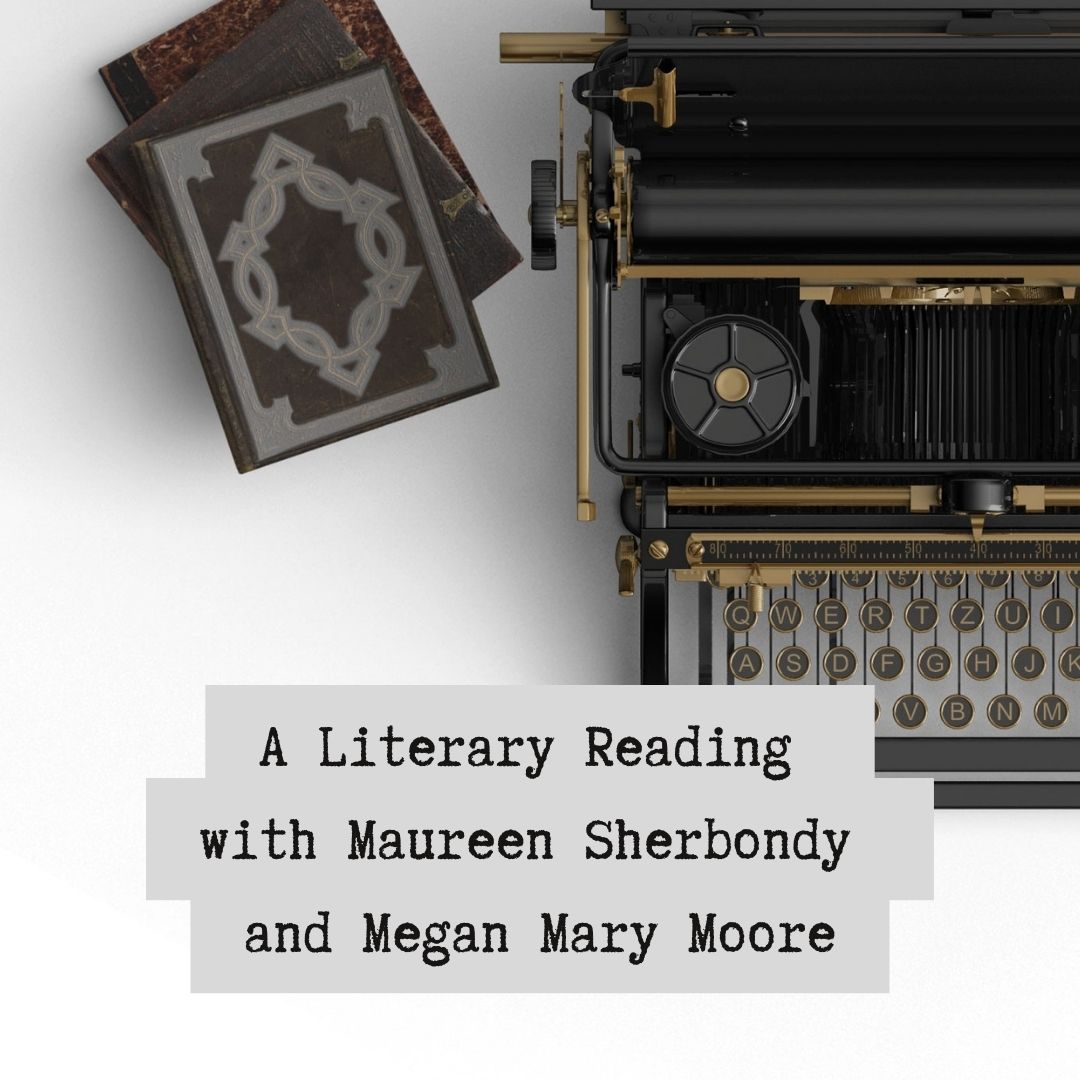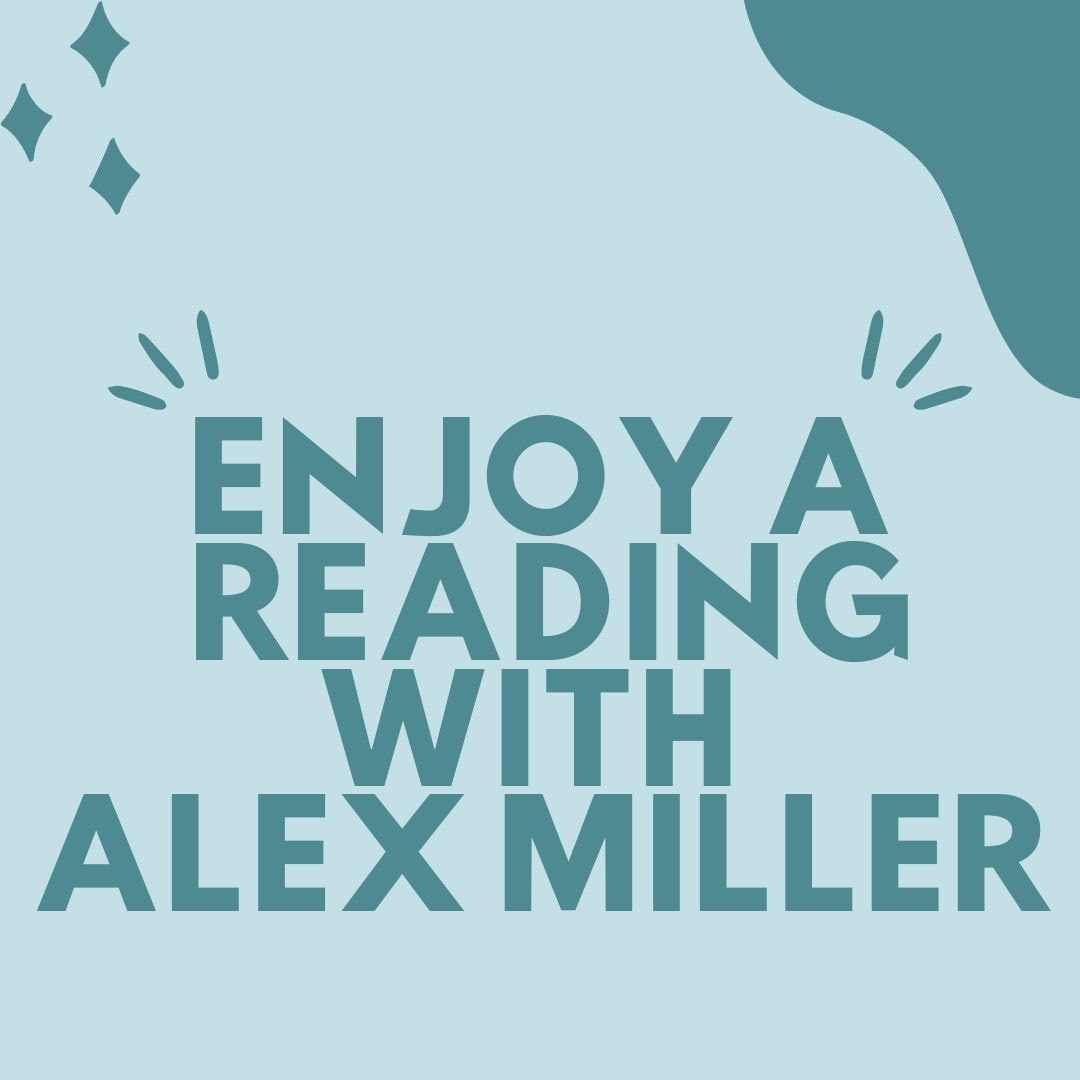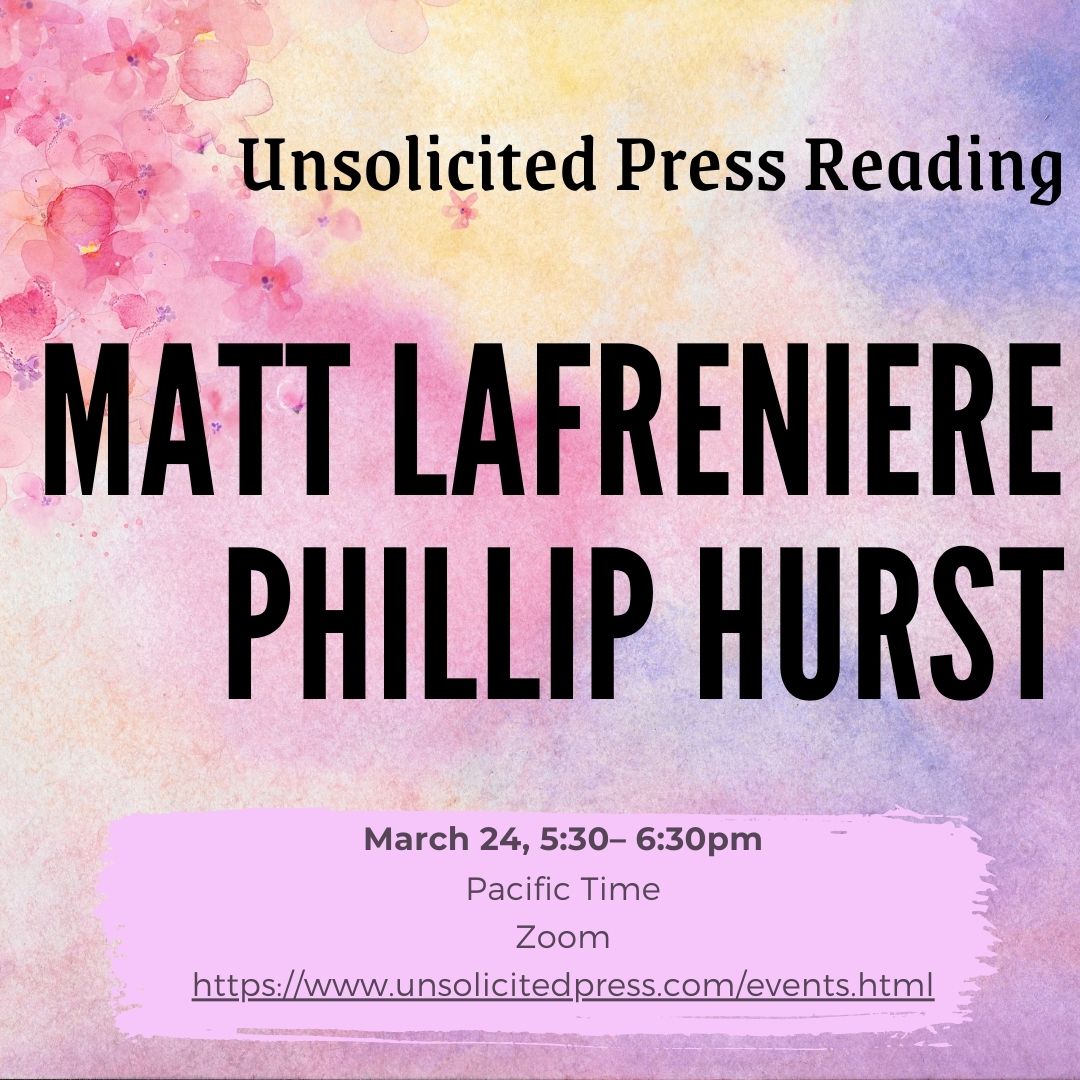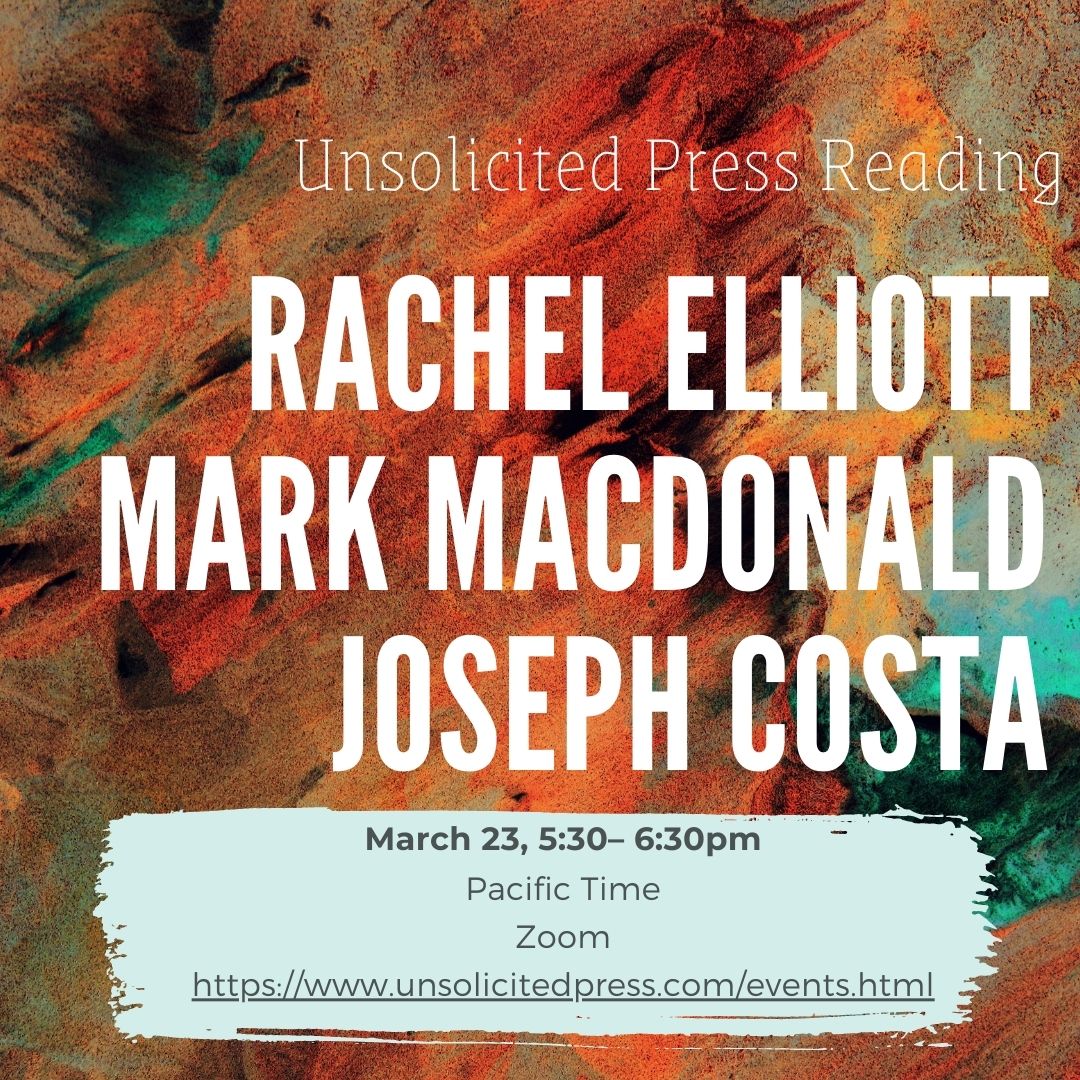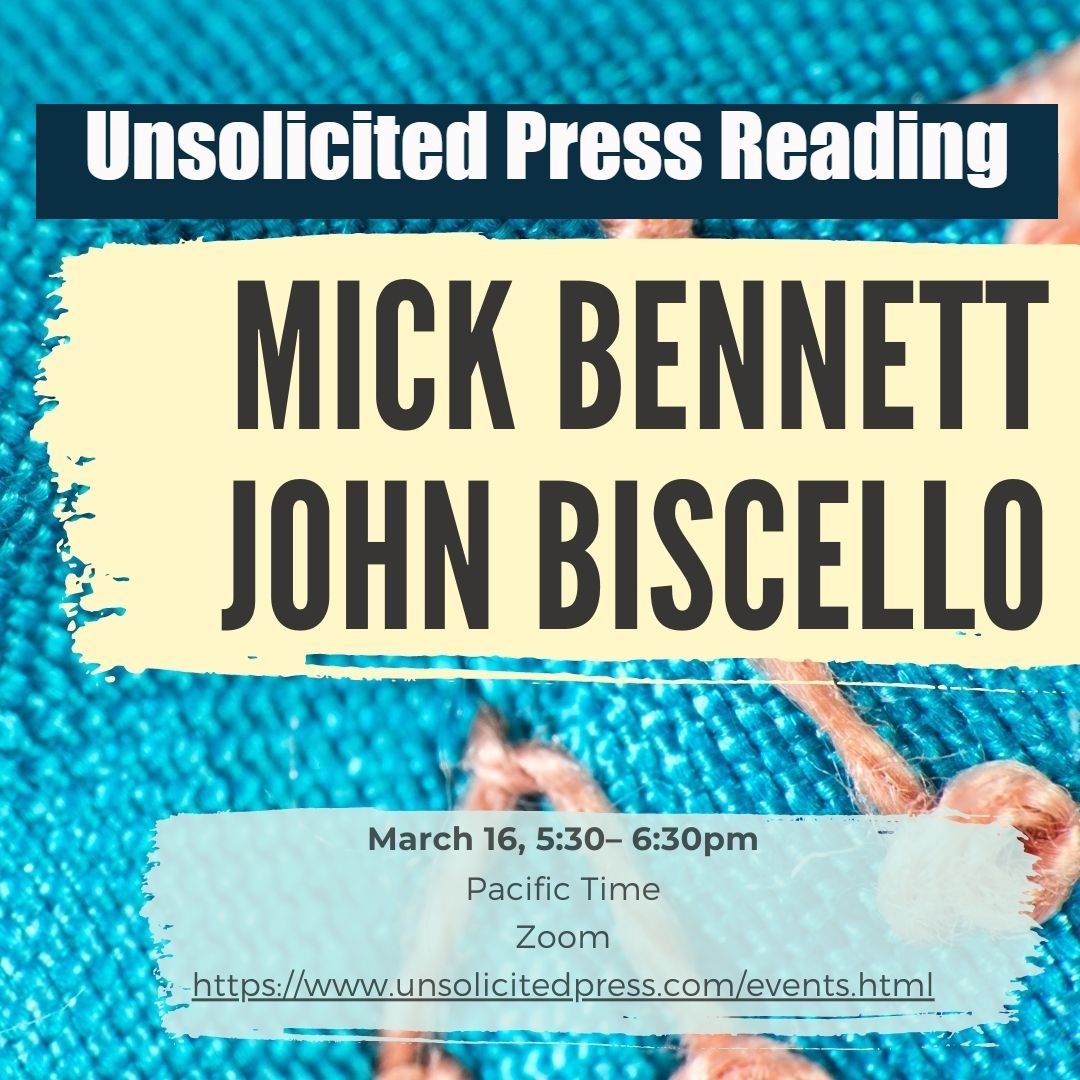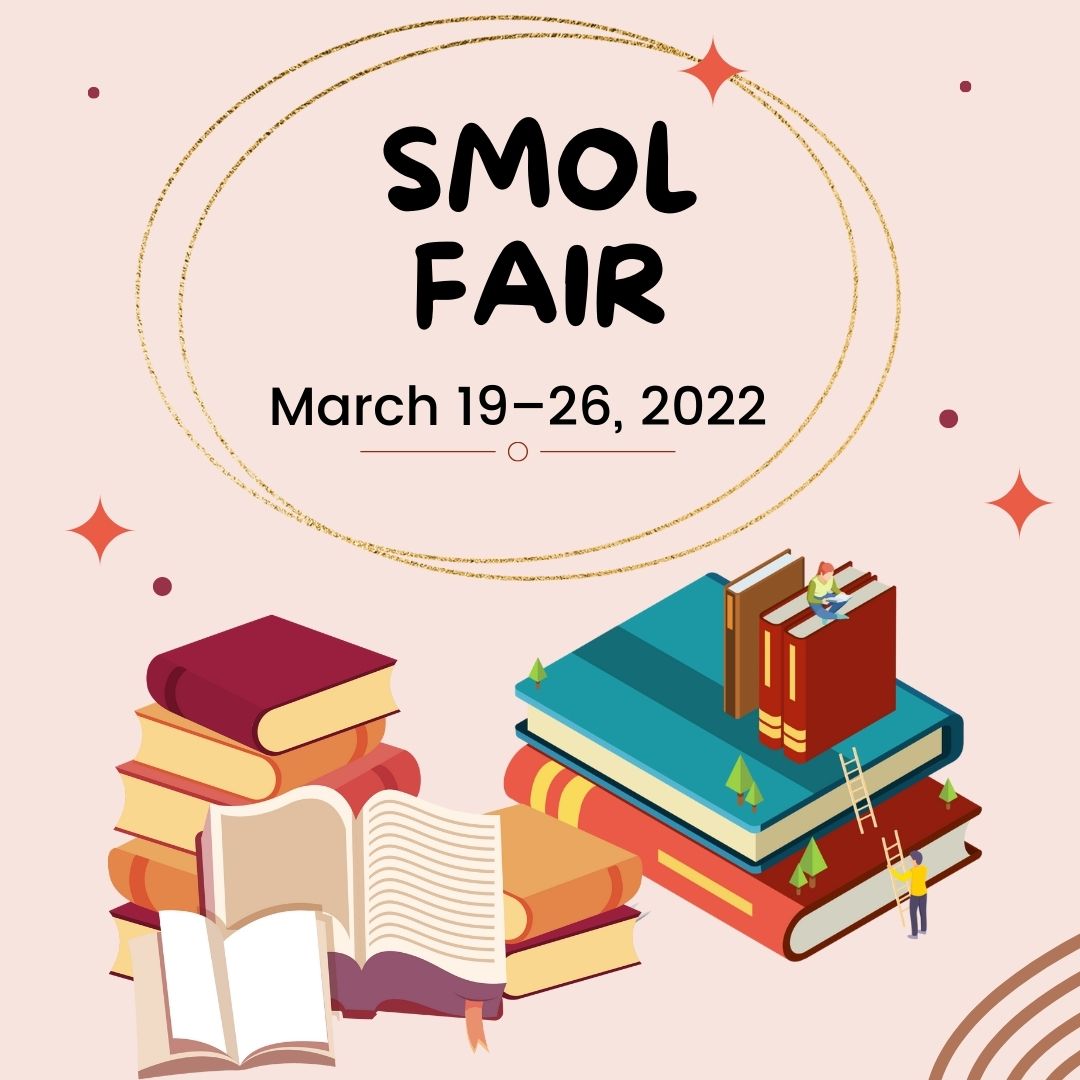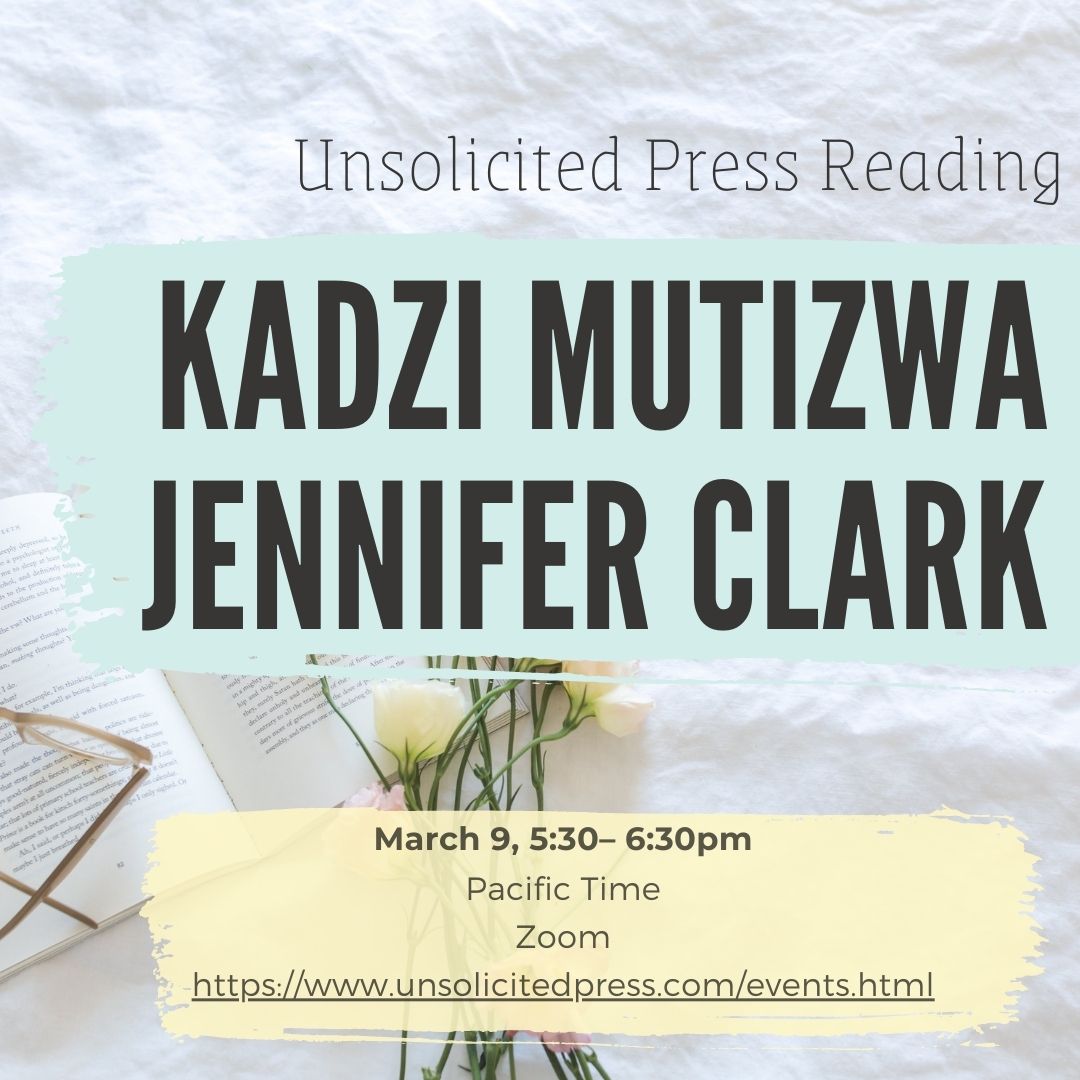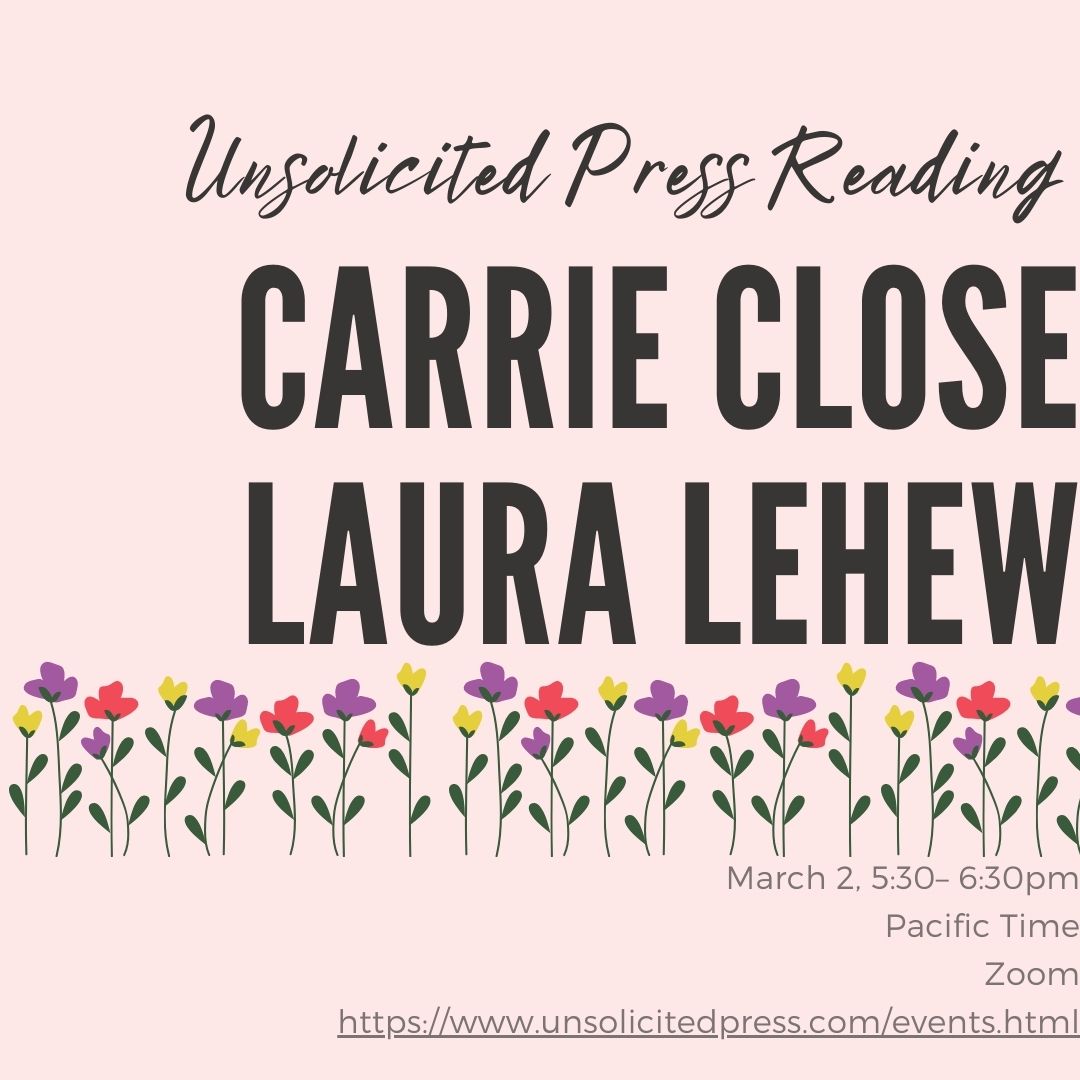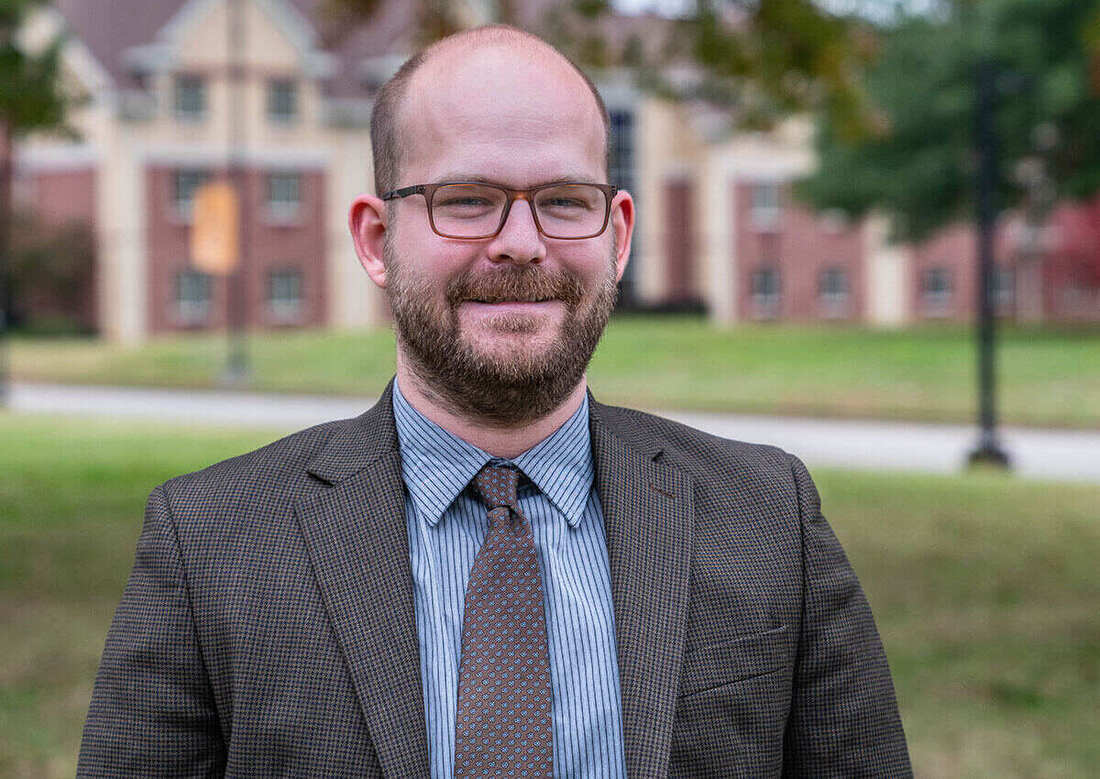 Born in Texas and raised in Chad, Aaron Brown is the author of the poetry collection, Acacia Road, winner of the 2016 Gerald Cable Book Award (Silverfish Review Press). He has been published in World Literature Today, Tupelo Quarterly, Waxwing, Cimarron Review, and Transition, among others, and he is a contributing editor for Windhover. Brown now lives in Texas, where he is an assistant professor of English and directs the writing center at LeTourneau University. He holds an MFA from the University of Maryland. John W. Bateman lives in the Deep South, chasing words and finding stories. Influences include comedian and writer Bob Smith, photographer Duane Michals, his fairy godparents, and coffee. His work has appeared in OneNewEngland, The Huffington Post, Glitterwolf Magazine, Nately's, the SFWP Quarterly, and lots of notebooks stacked in a bookcase somewhere. He has won a few awards for screenwriting and received a 2018 Emerging Filmmaker grant from the Mississippi Film Alliance. Who Killed Buster Sparkle? is his first novel. 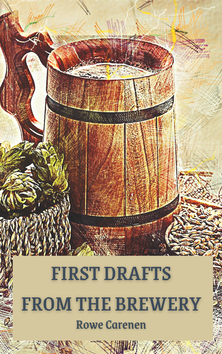 PORTLAND, OR; March 1, 2022--First Drafts from the Brewery explores the ends, and beginnings, of relationships, the value of true-blue friends, and the delights of the seasons. Less a how-to guide to divorce, and more a long and lingering porch-chat complete with good beer or a strong whiskey, this collection embraces simplicity while staring down pain without flinching. But not to worry, there’s plenty of cats, puppies, and cozy blankets. Praise for Rowe Carenen First Drafts from the Brewery is a book about repair, about what we do when the waters haven’t quite claimed us yet—that furtive in-the-meantime. “Grief,” our speaker says, “lives in my body.” But also in that body lies the psychic excavation of so many riches: confetti and PetSmart, Lemon Pledge and Elvis, resin. And in our grieving bodies we are kept such great company: land surveyors, Paul Simon, bad dates, grandparents, even famous writers. There lives inside these thoughtful and honest, observant poems invoking familiarity. I used to love a song that asked: “Where do you go when you’re lonely?” These poems answer that. You go everywhere, and with all your people, and with all your things. And you clink the festive glasses of curiosity and gratitude while you’re at it. --Mamie Morgan, author of EVERYONE I’VE DANCED WITH IS DEAD (Jackleg Press) About Rowe Carenen Rowe Carenen is a graduate of Salem College and the University of Southern Mississippi. When asked, she'd say that poetry has been her passion ever since she realized that words could convey more than just the facts. Her poems have appeared in various literary journals and magazines, including The Revenant Culture, GERM, Terrible Orange Review, the Running with Water anthology, and her first collection, In the Meantime, was published by Neverland Publishing in 2014. She lives in Greenville, South Carolina, with her cat Minerva Jane and dog Neville Jameson. About Unsolicited Press Unsolicited Press was founded in 2012 and is based in Portland, OR. The press strives to produce exceptional works of fiction, nonfiction, and poetry from award-winning authors. Learn more at www.unsolicitedpress.com. The publisher can be followed on Instagram and Twitter: @unsolicitedp First Drafts from the Brewery is available on April 19, 2022 as a paperback (88p.; 978-1-956692-12-9) and e-book (all major retailers). The title is distributed to the trade by Ingram. The author is open to speaking with the media, holding readings, and engaging in other author opportunities. Who are you as a poet? What do you represent? BB: I hope I never have an answer for this. I can tell you what other people would say about my voice. There are patterns, images that come again and again—flying, disappearing, dancing, jumping. Peacocks and racoons and fire escapes. Stellar nurseries. Blankets and threads. Wildness, mostly, strangeness, dream-like stuff—the mirror you find in the woods. The black widow you find crying on the windowsill. Buddhas and shadow goddesses. But I also have poems about discrimination and politics and Taco Bell. I don’t want a fixed idea of who I am as a poet or any other way, because once you have that idea you start living or writing within those boundaries, and one of my favorite things about writing is how my own poems surprise me and take me to new places. My best work is about moments when we become more than we are. There is a place for poetry on every topic and emotion, but my favorites are triumphant, a reminder to myself that I can fly, I will fly regardless of my wounds or fears or mistakes or other obstacles. That we are vastness, that separation is an illusion. That the destiny of consciousness is enlightenment. And when I feel the truth of it in my gut, that means it’s true for everyone, and I think everyone needs to be reminded sometimes that they are perfect, they are beauty, they are power and courage and they can fly too, because it’s easy to forget that in this world. What is your proudest poetic accomplishment? BB: My first published poetry collection, Only Flying, came out in November. In one sense, it’s something I’d been trying to do for two years, revising it and sending it out again and again to small presses. Unsolicited Press was the fifteenth place I had sent it, and I didn’t have much hope for publishing it anymore—I just kept doing it anyway. But in another sense, it’s something I had been trying to do for forty years, since I wrote my first poetry collection in first grade. My daughter was five months old when I signed the book contract, and I was teaching almost full time at PPCC. So for the entire process of editing, cover design, marketing, and all the other stuff that goes into making a book, I was working from a corner of the bedroom from 2-5 in the morning. My office is a divider in the room with a lamp with a blue light bulb in it, and I had to be careful not to type too loud. I couldn’t have done it without the help of my husband and the rest of my family. I still don’t know how I did it, really, but that’s what my life was like when it happened. It had been my dream since I was a little girl, so not doing it just wasn’t an option. Talk to us about your process writing and, if applicable, performing. BB: There are two ways for me, the mystical way and the conscious way. Just before the pandemic, I had my students compare the Nobel Prize for Literature speeches of Toni Morrison and Bob Dylan. Toni Morrison is incredibly conscious—she knows exactly what she’s doing and why she’s doing it. And next to her, Bob Dylan looks like an idiot—when you think of good stuff, you put it in a song, he says, because it looks good. Water flowing down a ladder—it looks good. You don’t know why, you just write it down. He’s not really an idiot, though. His process is just different—mystical. Some poems are gifts. Words and images just come sometimes, come through you, and then your job is to get out of the way so they can be born the way they want to. This is the poem that comes at three in the morning, half dream and half vision, words or just an image, water flowing down a ladder. Even if I don’t know what it’s supposed to mean, I scribble it on a sticky note because it’s my job to write it down. These are some of the most surreal pieces, the most mystical. Poetry is the furthest words can bend. Poetry uses words to go beyond words. That’s the magic of it—poetry hotwires the brain, bypassing the logic circuits and electrifying the heart directly. One misunderstanding about poetry is that it has to be understood with the head. You can feel it, experience it without that. Sometimes the head is the problem. You don’t have to know what it means; it’s moving through you into the world. I work both ways: other times ideas come from the mind or imagination or the news. On a conscious level, poetry is an attempt to communicate feeling, insight, vision. My most conscious poetry is an attempt to recreate a flash of insight—a moment of vastness, or beauty, courage, rebellion, love, gratitude. Truth. Oneness between people or with the world or with the self. The trick is to make it a journey for the reader’s own imagination, so they have their own flash. Before performing my work, I practice at home. I print it out in a big font and number the pages and highlight every other line. And if I get nervous, I picture somebody like Sarah Silverman making fun of me, like, “Oh, poor widdle baby! Are you scared to wead at the open mic? What do you think this is, The Tonight Show? Just do it, dummy.” How would you describe the poetry community in Colorado Springs and the Pikes Peak Region? BB: Most of my involvement in the local poetry community has been through Pikes Peak Community College, where I teach poetry and creative writing. When I finished my MFA, I immediately missed the deadlines, audience, and feedback on my work. Someone gave me the idea of starting a faculty writers’ group, and I did that—it’s called the Nearby Universe. But I made it for all employees, not just faculty, and I’m so glad I did. We have members from the testing center, admins, financial aid office, all over. Math and psychology teachers. It’s been all the things a community is—friendship, motivation, inspiration. A place to get honest feedback on our work. For almost five years now, we’ve been meeting once a month, taking turns workshopping and talking shop about publication, agents, imagery, style—really all things writing. Every winter, we have a write-in, too. We get together and just write next to each other for four hours, like parallel play for grownups. We used to do it downtown at a coffee shop, but the last few years we’ve been doing it on Zoom. Every class I teach is a poetry community, too. My students are amazing—they get me excited about writing again and again, challenge my ideas, and provide me with excellent reading. My students have written the best creative nonfiction braids I’ve ever read. How has poetry been a vehicle for activism, change, or advocacy in your life and community? BB: I have a few explicitly anti-racist and anti-sexist and anti-homophobic poems, and a lot of poems and stories about daring to be yourself and love yourself no matter what. So I hope their publication in literary magazines and in my collection has been a drop in the bucket somewhere. Within academia, change has been slow. Nationwide, college curriculums are starting to be more diverse, but the canon’s walls are thick. It has to start sooner than that. By the time they get to college, half my writers already think poetry’s not for them, not about them. Every semester I ask my students what poetry means, who they think of, and nobody says Lauren Hill or Kendrick Lamar. The answers are always the same: Sonnets. Rules. Shakespeare and Robert Frost and Edgar Allen Poe. What do they all have in common? They’re all dead, they say. All men. And all white. I use my classroom as a vehicle for change. In my poetry class, we study rap specifically, and 75% of the authors we read are people of color in all my classes. And when anybody questions that, I tell them I’m making up for lost time. What’s missing in our poetry community? BB: More emphasis on the arts and the imagination in education. More events and poetry play for kids and teenagers. I have 18-year-olds telling me they’re just not creative people—where did they learn that? The ideas that poetry is for everybody and that poetry is a way to freedom, a way to be yourself, not a dusty room full of rules, has to come sooner. What advances in poetry have you witnessed during your time in the poetry community? BB: The first poetry community I was a part of was my own group of friends in high school and college. Art was part of our connection—we would sing together. We would draw and paint and make sculptures and show each other. We wrote poetry—sometimes about each other—and we read our work to each other. We gave each other feedback, but mostly we uplifted each other and encouraged each other to keep writing and creating. So, in that sense, I’ve been in one poetry community or another for about 30 years. In that time, the biggest advance in the form itself has been the rise of prose poetry into the mainstream, the breaking of the only thing that was really holding poetry together, the only rule left: the line. This contributed to a psychological shift, I think, making poetry a little less pretentious and intimidating, and opening it up to new angles and voices. Now, boundaries between forms and genres are the thinnest they’ve ever been—there are graphic novels of poetry and computer games that should be called novels. There are novels written in hypertext, novels made of bites of prose poetry, and a thousand other hybrids and experiments happening. It’s an incredible time to be reading and writing poetry. What would you say to folks interested or just starting to engage with our poetry scene? BB: If you love it, do it. And don’t count yourself out until you’ve put your ten thousand hours into it. I get students who tell me they like poetry, they’re just not good at writing it, and when I ask how many poems they’ve written, the answer is five or ten or twenty or one. It takes time and effort. Take a class, and read it, and listen to it, and talk to other people who want to write it. Join a writers’ group, online or in person. How do you find and access our poetry community? Who are the players and places of connection? BB: My first poet friend was my grandmother, from as long as I can remember. Now I have a few close writer friends, people I can send drafts and fragments to and talk about ideas with, and I do the same for them. There’s also my writers’ group at PPCC, the Nearby Universe. There are literary magazines I follow and submit to regularly, like A Story in 100 Words and Loud Coffee Press. There’s a lot of community out there that I would love to explore if I had time, like The Pikes Peak Writers Association and Ashley’s group, Poetry 719. I want to go to AWP. But I’m a mom and my babies come first. I have two kids and I have a trampoline. So my plate is very full right now, but it’s delicious. I wouldn’t change a thing. You can support Brook Bhagat by ordering a copy of her book ONLY FLYING.
North Carolina Poet Maureen Sherbondy Releases 11th Poetry Collection: LINES IN OPPOSITION4/12/2022
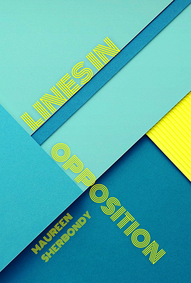 PORTLAND, OR; April 12, 2022--Poet Maureen Sherbondy has had enough. Her eleventh collection, Lines in Opposition, explores our need to set limits in times of conflict and confusion. These poems of defiance range from the artistic to the political to the familial, from Basho to Godot, Gretel to Ashbery, the Rockettes to Bubble Yum. At times wry and whimsical, at other times acutely serious, Sherbondy's poems testify to the importance of knowing when and how to draw the line. About Maureen Sherbondy Maureen Sherbondy’s poems have appeared in Prelude, Calyx, European Judaism, The Oakland Review, and other journals. She has won the Hart Crane Memorial Poetry Contest, the North Carolina Poet Laureate prize, and many other awards. Her most recent poetry books are Dancing with Dali, The Art of Departure, and Eulogy for an Imperfect Man. Sherbondy teaches English at Alamance Community College in Graham, North Carolina. About Unsolicited Press Unsolicited Press was founded in 2012 and is based in Portland, OR. The press strives to produce exceptional works of fiction, nonfiction, and poetry from award-winning authors. Learn more at www.unsolicitedpress.com. The publisher can be followed on Instagram and Twitter: @unsolicitedp LINES IN OPPOSITION is available on April 12, 2022 as a paperback (106 p.; 978-1-956692-10-5) and e-book (all major retailers). The title is distributed to the trade by Ingram. The author is open to speaking with the media, holding readings, and engaging in other author opportunities. Join us on Wednesday to celebrate the poetry of Maureen Sherbondy and Megan Mary Moore. Same time: 5:30PM Pac Time. Same place: Zoom Same people: Managing editor hosting You can log onto the event here. Megan Mary Moore is passionate about horror and poetry. She holds an MFA in poetry from Miami University. Her work has appeared in Rattle, Rogue Agent, Haunted are These Houses by Unnerving Press. She lives in Cincinnati, Ohio where she teaches dance and talks to ghosts. Maureen Sherbondy has been published in Calyx, European Judaism, The Oakland Review, Prelude, and other journals. Her poetry books include Eulogy for an Imperfect Man, Beyond Fairy Tales, The Art of Departure, and six chapbooks. LINES IN OPPOSITION by Maureen Sherbondy
$16.95
$14.41
Poet Maureen Sherbondy has had enough. Her eleventh collection, Lines in Opposition, explores our need to set limits in times of conflict and confusion. These poems of defiance range from the artistic to the political to the familial, from Basho to Godot, Gretel to Ashbery, the Rockettes to Bubble Yum. At times wry and whimsical, at other times acutely serious, Sherbondy's poems testify to the importance of knowing when and how to draw the line. Book Details Genre: Poetry ISBN:978-1-956692-10-5 Publication Date:4/12/2022 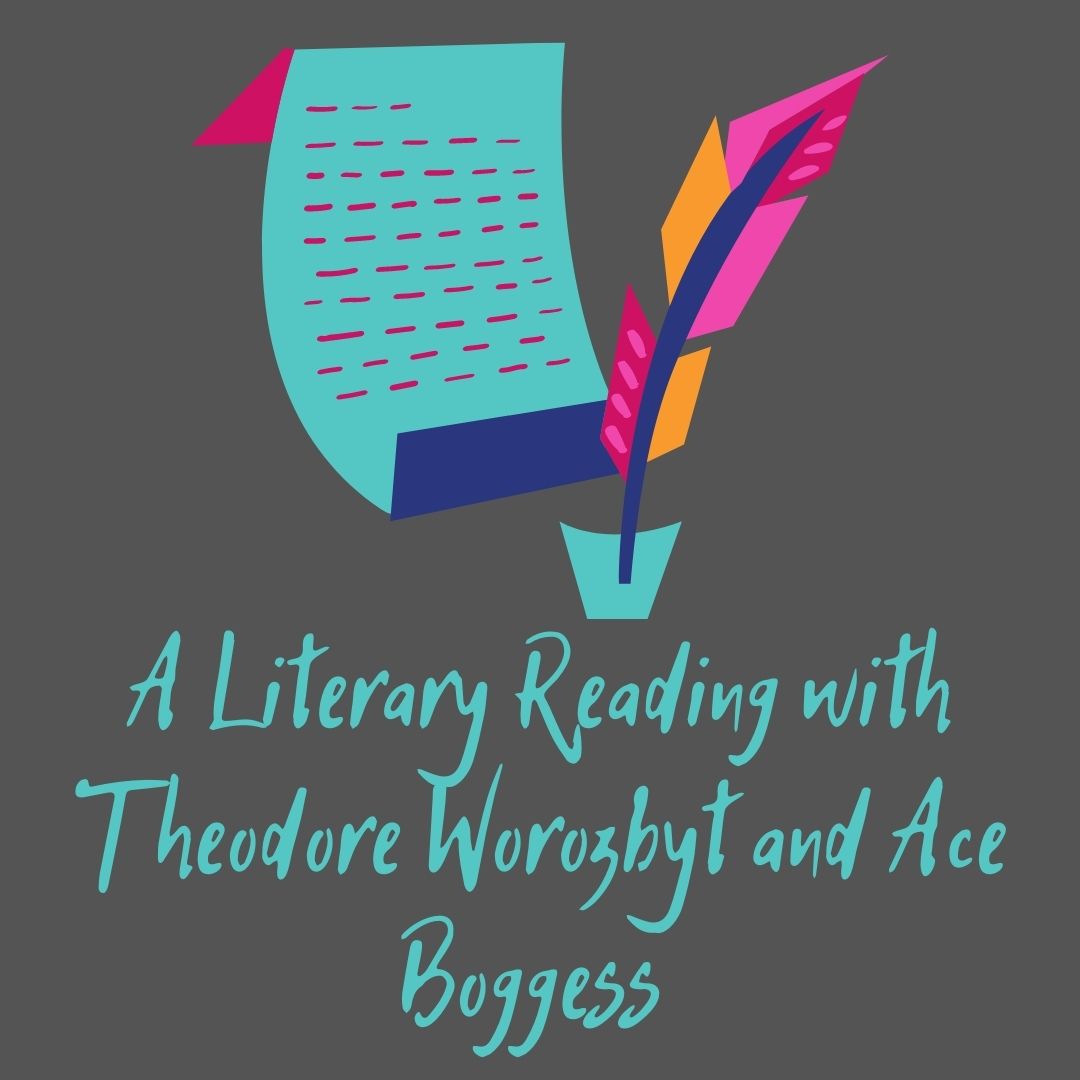 We are hosting a special reading on Tuesday, April 12, 5:30pm – 6:30pm in honor of Ted's book coming out! Head over to the events page to access the event. No RSVP required. Ace Boggess is author of the novels States of Mercy and A Song Without a Melody, but is known more for his four books of poetry: I Have Lost the Art of Dreaming It So, Ultra Deep Field, The Prisoners, and The Beautiful Girl Whose Wish Was Not Fulfilled. His writing, both poetry and prose, has appeared in hundreds of literary journals, including Harvard Review, Notre Dame Review, The Bellingham Review, Rattle, River Styx, North Dakota Quarterly, J Journal, Mid-American Review, and Southern Humanities Review. He received a fellowship for fiction from the West Virginia Commission on the Arts and spent five years in a West Virginia prison, an experience he writes about with intensity and humor. Theodore Worozbyt has received grants from the NEA, and the Georgia and Alabama Councils for the Arts. His work appears widely, in such publications as Antioch Review, Bennington Review, Kenyon Review, New England Review, Poetry, Po&sie, The Southern Review, and TriQuarterly. His books are The Dauber Wings, Letters of Transit, winner of the Juniper Prize, and Smaller Than Death. He teaches at Georgia State University. I Have Lost the Art of Dreaming It So by Ace Boggess
$16.00
$14.41
I Have Lost the Art of Dreaming It So is comprised of poems the author wrote as responses to questions he collected over the years, whether asked directly or mined from other poems, novels, billboards, surveys, Facebook memes, leaflets, and many other places. He used these questions as a way of looking inside his life, the lives of the askers, and the world around him. Genre: Poetry ISBN: 978-1-947021-32-7 Release: August 28, 2018 TUESDAY MARRIAGE DEATH by Theodore Worozbyt
$16.95
$14.41
The first poem in this fourth full-length collection by Theodore Worozbyt closes with an image that suggests a mythical bird, transcendence, unending wealth and success, caesarean birth, violent death, a surgeon lurking in the name of an ancient fish, and an end that comes as a beginning: “Golden eggs /slit from a sturgeon's belly finish it.” So begins the undertaking, in this volume, to compress language itself into a ball, to roll it forth, not toward one overwhelming question, but to scores of them. If the title arcs a life with astonishing and unnerving brevity, and if most of those overwhelming questions remain unanswered, the title poem turns to us, on the final page, to offer the only human consolation we ever get to keep: “Let us begin again.” Book Details Genre: Poetry ISBN:978-1-956692-09-9 Publication Date: April 5, 2022 If you could cook dinner for any author, dead or alive, who would it be? What would you make? T. S. Eliot. I would make a roast chicken with gravy, mashed potatoes, and asparagus. What scares you the most about the writing process? How do you combat your fears? That I will run out of interesting things to write about. I combat my fears by reading work by other writers. I also spend a lot of time listening to the world around me and paying attention. Who is your biggest literary crush, author or character? F. Scott Fitzgerald What books are on your nightstand? Greasy Lake (T.C. Boyle), The Immortalists (Chloe Benjamin), By the Wayside (Anne Leigh Parrish). I carry around books by Robert Bly and John Ashbery for poetry inspiration. Favorite punctuation mark? Why? : I like lists. What book were you supposed to read in high school, but never did? I was an obedient student. I read every single assigned book. And I loved to read. What inanimate object would you thank in your acknowledgements? My coffee pot. If you could write an inspirational quote on the mirrors of aspiring writers, what would you write? Don’t give up. Only writers who give up never get published. Does writing energize or exhaust you? Writing energizes me and keeps me balanced. What are common traps for aspiring writers? Trying to chase trends. Trying to write like the masters. What is your writing Kryptonite? A negative political climate. Have you ever gotten reader’s block? No. I have a very active imagination. Do you think someone could be a writer if they don’t feel emotions strongly? Yes, but their work might be terrible and distant. What other authors are you friends with, and how do they help you become a better writer? Sharon Kurtzman, Jacob Appel, Therese Fowler, Elaine Orr, Crystal Simone Smith, Diane Chamberlain, Barry Peters. Yes, they nourish me as a writer. Do you want each book to stand on its own, or are you trying to build a body of work with connections between each book? Some of my books work together. Some stand alone. How did publishing your first book change your process of writing? Not at all, but I took myself more seriously as a writer. What was the best money you ever spent as a writer? Buying more books and attending writers’ conferences What authors did you dislike at first but grew into? I like all authors. What was an early experience where you learned that language had power? My first words to my mother: “Let me do it myself” What’s your favorite under-appreciated novel? This Side of Paradise. Gatsby gets all the attention. As a writer, what would you choose as your mascot/avatar/spirit animal? A horse or a frog. What do you owe the real people upon whom you base your characters? I make my characters up. What does literary success look like to you? I write one new poem or story a week that I am pleased with. What’s the best way to market your books? I give readings, appear on NPR, and teach workshops. What’s the most difficult thing about writing characters from the opposite sex? I do better writing characters from the opposite sex because I have been surrounded by brothers and sons my whole life. I have much male energy. What did you edit out of this book?” I deleted a few poems that felt weaker. If you didn’t write, what would you do for work? I teach full-time. I sold workers’ compensation before. I think I would study rocks. 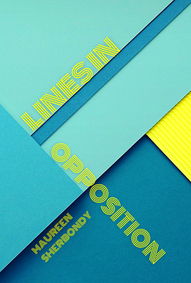 Maureen Sherbondy is the author of LINES IN OPPOSITION, a poetry collection. In Lines in Opposition, Sherbondy explores our need to set limits in times of conflict and confusion. These poems of defiance range from the artistic to the political to the familial, from Basho to Godot, Gretel to Ashbery, the Rockettes to Bubble Yum. At times wry and whimsical, at other times acutely serious, Sherbondy's poems testify to the importance of knowing when and how to draw the line. If you could cook dinner for any author, dead or alive, who would it be? What would you make?
Penny Niven. She was my mentor and I’d make truffle mac & cheese with ground bison, roasted brussels sprouts, and Guinness Chocolate Cake. What scares you the most about the writing process? How do you combat your fears? That I’ve already written my best stuff. So I just breathe, accept that that may be true, and write anyway. Who is your biggest literary crush, author or character? Oh Ross Gay! I’m utterly in love. What books are on your nightstand? Bible, Jim Butcher’s White Night, Flannery O’Connor’s Prayer Journal Favorite punctuation mark? Why? I LOVE a semicolon! I think it is entirely underused. What book were you supposed to read in high school, but never did? Sorry, I read them all. What inanimate object would you thank in your acknowledgements? My “Joy” tea mug If you could write an inspirational quote on the mirrors of aspiring writers, what would you write? The world is better with your voice in it. Does writing energize or exhaust you? Yes, both. Sometimes I’ve had several poems in the back of my head and finally getting them out is energizing. But other times I’m writing some of the harder darker stuff and I just want a nap. What are common traps for aspiring writers? Editing while writing. Just get the words out there and THEN go back. What is your writing Kryptonite? Crippling self-doubt Have you ever gotten reader’s block? Sure! Hate it. Do you think someone could be a writer if they don’t feel emotions strongly? No, I don’t. I think so much of writing is from an emotional place. Now, my father (award winning novelist John Carenen) says he doesn’t have emotions, but I beg to differ. What other authors are you friends with, and how do they help you become a better writer? I have an incredible writers’ group full of friends. They are forever encouraging me to to write more and tell the truth. In my head I’m bffs with Leesa Cross-Smith. Her books make me a better writer because she is so honest and beautiful and rich in writing. Do you want each book to stand on its own, or are you trying to build a body of work with connections between each book? I think it is a body of work, but more tracking my own growth and progress as a human. How did publishing your first book change your process of writing? I don’t think it has. I hope not. What was the best money you ever spent as a writer? My faux fireplace in my living room. It creates exactly the right cozy vibe. What was an early experience where you learned that language had power? When I was maybe 9 I tried writing a Doogie Howser esq journal and shared it with my mother. She teared up and I realized that I could share what I was feeling without having to say a word out loud. What’s your favorite under-appreciated novel? I’m going to have to go with Leesa Cross-Smith’s Whiskey and Ribbons. I think it is nothing short of brilliant. Her prose is often poetic and I get swept up in her language. Also the Alice Hoffman Practical Magic series. I love her work and I just want to wear warm sweaters, leggings, and fuzzy socks and curl up on the couch with my cat and some tea and get lost in her world. As a writer, what would you choose as your mascot/avatar/spirit animal? I’d like it to be an owl, but in reality my cat Minerva. What do you owe the real people upon whom you base your characters? I don’t think I owe them anything. Maybe a heads-up that they’re in the book? How many unpublished and half-finished books do you have? Two What does literary success look like to you? Just that strangers found hope or some aspect of themselves in my words. What did you edit out of this book?” Poems that didn’t ring true any more. If you didn’t write, what would you do for work? Yoga teacher. I’m certified, but my creativity goes into my writing and my editing. 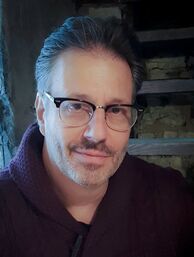 If you could cook dinner for any author, dead or alive, who would it be? What would you make? John Irving. The Hotel New Hampshire made me want to be a writer. He lives in Toronto which is only a couple hours from Buffalo, so he could hop on QEW and be here in no time. I’d cook a big Greek meal for him: salad, dolmades, spanokopita, pastichio, roast lamb, lemon potatoes, and galaktoboureko for dessert. Then we’d clear the dishes, move the table and chairs, and wrestle best two out of three. Ouzo for the winner. What scares you the most about the writing process? How do you combat your fears? Honestly, nothing scares me about the writing process. It’s the outcome of the process that scares me. What if this book isn’t as good as the last one? What if it gets bad reviews? What if it doesn’t sell? Those are the things that scare me. How do I combat those fears? I try to write the best book I can. Then the book goes out in the world and out of my control and I hope for the best. Ouzo also helps. What books are on your nightstand? The Eighth Detective by Alex Pavesi and The Fountain by David Scott Hay. I highly recommend both. Favorite punctuation mark? Why? I don’t have a favorite or least favorite punctuation mark. I do have an unnatural attraction to italics, however. I love to italicize everything. I’m sure it drives my copy editors nuts. The funny thing is, I know the rules for italicizing, but I go ahead and italicize for no apparent reason. It’s a sickness, I tell ya. What book were you supposed to read in high school, but never did? Don’t tell Mrs. Prince from Kenmore West Senior High School, but I never read The Taming of The Shrew in 11th Grade. I don’t think I even started it. I took one look at the cover and decided that the play was untameable. Now I feel guilty and will have to read it. Hell, I bet I still owe Mrs. P a paper, too. What inanimate object would you thank in your acknowledgements? The MacBook Pro. Sure, the old Remingtons and Royals are cool looking and romantic, but no spell check? No cut and paste? Wite-Out, for God’s sake?? Plus, I do a lot of writing in bed. There’s no way I could balance a typewriter on my chest. The Mac definitely deserves a shout out. If you could write an inspirational quote on the mirrors of aspiring writers, what would you write? Well, first off, sneaking into other people’s steamy bathrooms is a little weird. But if I did, and I didn’t get caught, shot, or arrested, I’d simply write, ‘Don’t quit’. That’s it. Just a simple reminder that nothing will be published, read, or reviewed if you decide you’re not good enough or that writing is too hard. So, don’t quit. Does writing energize or exhaust you? It energizes me for a while, but then when that high wears off I need a nap. I’m an excellent napper. That’s not bragging. If napping was an Olympic sport, I’m definitely up on that medal stand. What are common traps for aspiring writers? Self-doubt is a big one. It can paralyze a writer to such a degree that they can’t write a single word. Then the frustration sets in and they throw up their arms and decide it’s easier to binge something on Netflix than it is to be brave and write something–anything– and risk failure. The opposite is also true. Aspiring writers sometimes think publication will come more quickly than it does. They don’t understand that you got to play the long game when it comes to writing. You have to live and learn and go through all the shit–heartbreak, sickness, divorce, deaths. And you have to go through the good stuff, too–the births, the weddings, the successes, the friendships, the love affairs. Then once you know a little bit about life, you have to practice your craft, improve your skills, learn how to write. All that doesn’t come quickly for most of us. Sometimes inspiring writers are too impatient to wait for all that and they end up pressing that Netflix button on the remote, too. What is your writing Kryptonite? Late nights. I write from five to seven in the morning. If I’m out late, the chances of me answering that 4:45 bell is pretty slim and then I’m in a crappy mood all day. Luckily, I’m getting older and the late nights aren’t that much of a problem anymore. But every once in a while… Have you ever gotten reader’s block? I used to travel for my day job. I was a real road warrior, hopping on a plane almost every Monday morning. I did most of my reading in airports, on planes, and in hotel rooms. When I switched jobs about six years ago, travel wasn’t required as much in my new role and for the first time in my life I had to make time to read. This did not stop me from buying books and the To Be Read pile grew higher and higher… Do you think someone could be a writer if they don’t feel emotions strongly? Technical writers can get away with it, I guess, but not fiction writers. A fiction writer needs to create characters that readers care about. If readers don’t care, they’ll stop reading and pick up another book written by a different author. If an author doesn’t feel emotions strongly, they can’t convey them. How can they expect their readers to feel anything if they can’t? It can’t be done. What other authors are you friends with, and how do they help you become a better writer? This is an easy one. Carla Damron, Dartinia Hull, Beth Uznis Johnson, and Ashley Warlick. We’ve had a group text thread going for ten years. I’d say 90% of those texts have absolutely nothing to do with writing, but we do critique each other's work, share information about agents, publicists, and editors, gossip about other writers, and complain passionately about our publishers. It’s a hell of a lot of fun. And I couldn’t even begin to quantify how they’ve made me a better writer or a better person. They’re family. Do you want each book to stand on its own, or are you trying to build a body of work with connections between each book? Each book has to stand on its own and make its own way in the world. But I’ve staked out my turf. Buffalo, New York is my hometown, and this is the place I want to write about, the place I want to explore. I’m fascinated by the stories and architecture here. This town feeds my imagination and inspires me to write. So, while each book will stand alone, they’ll be connected by a sense of place, a mythical Buffalo that’s known economic booms and financial busts and is rich with stories about bootleggers, bank robbers, and even the birth of The Lone Ranger, not to mention my own family history. It’s going to be a lot of fun to continue writing about this city and its characters. Oh, and Go Bills! How did publishing your first book change your process of writing? I don’t think publishing changed my process, but age certainly has. For years, the alarm would sound, and I’d go up to my attic office and start writing by 5am. Then one day about four years ago, I couldn’t get out of bed. I was awake, but I couldn’t kick the covers off and go to work. It was a mental thing. I remember it was early November, the house was cold, and I just couldn’t physically get out of bed at 4:45. I missed three or four writing days in a row, and was really beating myself up about it, calling myself weak and lazy and just generally hating myself. Then I realized something: laptops are portable. If I couldn’t go to my laptop that early, my laptop would come to me. Since that realization, I’ve put my fully-charged laptop next to my bed at night and when I wake at 4:45, I just grab it and start writing propped on pillows. What was the best money you ever spent as a writer? Tuition for Queens University of Charlotte’s MFA program. Going there was a game changer. Before that, I had been writing for over twenty years with just a handful of published short stories to show for my efforts. I approached Queens as my last shot of ever having any sort of successful writing life. Something clicked while I was there. The concept of ‘story’ became more clear. My writing became cleaner. I graduated ten years ago and have written four books since then. An MFA might not be for everybody, but for me it changed everything. I owe Fred LeBron and his faculty a great deal. What’s your favorite under-appreciated novel? You know, it’s probably odd to think that a Pulitzer Prize winner is under-appreciated, but I think William Kennedy falls into that category. Do people in their twenties, thirties or forties even know Kennedy? Do they read Ironweed? Those Albany novels–Ironweed, Legs, Billy Phelan’s Greatest Game–made a huge impact on me. I want to do for Buffalo what he did for Albany. Actually, I think I need to go back and re-read those books, to re-learn from the master of historical fiction with a strong sense of place. Hell, I think everyone should. As a writer, what would you choose as your mascot/avatar/spirit animal? I have a one-eyed Shi Tzu named Coco. She’s actually my daughter’s dog, but I’m home all the time so she spends a lot of the day with me. Coco has a bed in my office and has claimed the foot of my bed as her own. She’s been at my side or feet for the writing of all my books. If she’s not my spirit animal, she may very well be my muse. What do you owe the real people upon whom you base your characters? Man, I owe them everything: for the inspiration to write about them, for the curiosity to learn more about them and the times they lived in, for giving me a story to flesh out and make my own. I’ve spent so much time with the characters from Rook–Al, Lolly, and Bobby–as that book evolved from a novella, to a trilogy of novellas, to my first novel that when I was done, I actually missed them, even psychotic Bobby. I liked spending all that time with them. I liked getting to know them. In a way, I was sorry that it ended. How many unpublished and half-finished books do you have? I think I have three early, really sucky novels that were unpublishable. I took one, Slip Kid, and distilled that into a short story that appears in my collection, Muscle Cars. The other two are unsalvageable, I think, but I haven’t looked at those in a long time. Maybe there’s something in them that I can steal. I also have a manuscript that I just finished. I’m calling it my pandemic novel because I started it when we were locked down. I need to revise that one. So, we’ll call it four altogether. What does literary success look like to you? Well, that’s an interesting question. I think my answer to that has evolved over the years. First, success was just to get published, and I accomplished that with the publication of my story collection, Muscle Cars. Then success became getting a novel published. Rook is my debut novel, so that definition of success has become moot. So, at least for now, literary success has become the desire to create a body of published work that when read in its entirety people will say to a friend, “That kid had a hell of a career.” What’s the most difficult thing about writing characters from the opposite sex? Developing fully developed characters is the same regardless of the character’s gender, so in that respect it’s not any harder or easier for me to write a female character. And the same rules also apply: be original, don’t be cliched, don’t be lazy in the descriptions, etc. Having said that, I’m blessed that the writers personally closest to me are all women and will call me out if I get something wrong about a female character. Carla Damron, Dartinia Hull, Beth Uznis Johnson, and Ashley Warlick are my secret weapons when writing female characters, What did you edit out of this book? Rook evolved from a trilogy of novellas to a novel. The second novella in the trilogy concentrated on Al’s time in federal prison. I had obtained Al’s prison record under The Freedom of Information Act, so I had an understanding of his time behind bars. In addition, he was writing then so I knew what he was writing and where he was being published. He even wrote an account of when Johnny Cash came and gave a concert for the inmates. Plus, I knew about his correspondence and relationship with his writing mentor Dan Marlowe thanks to Charles Kelly’s fine book Gunshots In Another Room: The Forgotten Life of Dan. J. Marlowe. So, I had a lot to draw from from that period of Al’s life. But as the novel came into focus, those prison years no longer fit in Lolly’s and Al’s story. Those ninety pages were cut. It was actually a pretty easy decision once I figured out what the book was about. If you didn’t write, what would you do for work? I can’t imagine not writing. 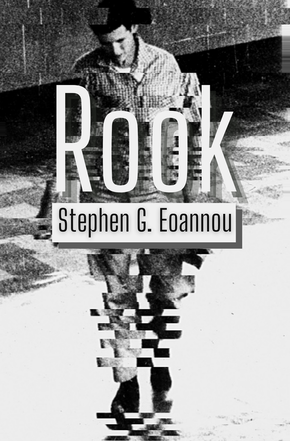 Stephen G. Eoannou is the author of ROOK, a novel based on the true story of Al Nussbaum. To his unsuspecting wife, Lolly, Al is a loving, chess playing, family man. To J. Edgar Hoover, he is the most cunning fugitive alive. Al is the mastermind behind a string of east coast robberies that has stumped law enforcement. Order Here. Alex Miller is a Pittsburgh-based writer, journalist and graphic designer. His fiction has been published widely in print and online journals, including Maudlin House, Whiskeypaper and Rabbit Catastrophe Review. He is the author of the novella, “Osama bin Laden is Dead,” a coming-of-age story set in a small town in post-9/11 America. He is the former head of design for Fifth Wednesday Journal and has lived and worked in Nashville, Chattanooga, Daytona Beach and the Big Island of Hawaii. A Florida native, he grew up in Spring Hill, Tennessee.
Miller is the author of How to Write an Emotionally Resonant Werewolf Novel. The stories in How to Write an Emotionally Resonant Werewolf Novel were written during the tumultuous years following the global financial crisis. They show us glimpses of ourselves as we fold shirts for minimum wage at the mall, scrape together rent money from tips earned waiting tables, stay up until 3 a.m. playing video games, skip school, skip work, smoke cigarettes, watch resignedly as our nation marches to war, cheat on the people we love, linger at night on their social media pages, and find ourselves suddenly alone and at peace, standing on a hilltop with birds. You can join the virtual event tonight, March 30, by popping over to our events calendar and clicking on the event. Invite your friends!!! 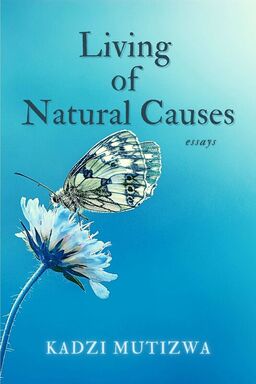 PORTLAND, OR; March 29, 2022--Who says a coming-of-age saga can’t extend well into your thirties? In these 12 humor-laced personal essays, Kadzi Mutizwa (a midwestern New Yorker) reflects on her trajectory as a high(ish)-functioning outlier. Themes taken up include mounting self-awareness, facing your foibles and failures, not giving up while becoming more measured about giving in, sucking at yoga, and gradually rising into your full authenticity. All this from a woman who, among other things, refuses to wear makeup. Living of Natural Causes is about recognizing how complex each of us are and should be. Praise for Kadzi Mutizwa "Quietly smart and sneakily insightful, Living of Natural Causes perfectly captures the unglamorous reality of coming into adulthood. Kadzi Mutizwa is a fierce and honest observer of people and places, and her wise words will stay with you. Reading this book is like a conversation with a true friend." —Kirsa Rein, TV writer/producer, Orange Is the New Black and Dexter: New Blood About Kadzi Mutizwa Originally from Cleveland, Ohio, Kadzi Mutizwa now lives in New York City. Living of Natural Causes is her first book. About Unsolicited Press Unsolicited Press was founded in 2012 and is based in Portland, OR. The press strives to produce exceptional works of fiction, nonfiction, and poetry from award-winning authors. Learn more at www.unsolicitedpress.com. The publisher can be followed on Instagram and Twitter: @unsolicitedp Living of Natural Causes is available on March 29, 2022 as a paperback (178 p.; 978-1-956692-08-2) and e-book (all major retailers). The title is distributed to the trade by Ingram. The author is open to speaking with the media, holding readings, and engaging in other author opportunities. ### Press only, Unsolicited Press 619.354.8005 marketing@unsolicitedpress.com For artist interviews, readings, and podcasts: Kadzi Mutizwa 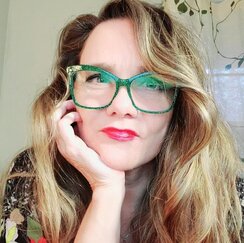 If you could cook dinner for any author, dead or alive, who would it be? What would you make? I don’t cook! I would take Paul Celan to a drive-thru fast food and then sit in the car and eat fries with him. What scares you the most about the writing process? How do you combat your fears? That I will fail. Tell myself that I will fail. Walk through the fire. Who is your biggest literary crush, author or character? Oh! Ingeborg Bachmann or Anne Carson. Hard to decide! What books are on your nightstand? I can’t read in bed. I have books piled all around my work area and work space. But right next to me now are ALCOOLS (Apollinaire), A POET IN THE WORLD (Levertov), and New Urge Reader 4:Erotic Fiction by New Women Writers (New Urge Editions) Favorite punctuation mark? Why? Holy God the colon: it is a masterpiece of announcement. What book were you supposed to read in high school, but never did? Electric Kool-Aid Acid Test What inanimate object would you thank in your acknowledgements? My laptop If you could write an inspirational quote on the mirrors of aspiring writers, what would you write? Don’t fuck up! Does writing energize or exhaust you? I am unstoppable when doing vispo and asemics. What are common traps for aspiring writers? Do not follow others, or dress like others! You don’t have to wear a scarf or glasses! What is your writing Kryptonite? People shuffling and rooting in the kitchen while I am working Have you ever gotten reader’s block? I am not good at reading. I have to do it my own way, on my own time. I don’t get how people can just sit down and read an entire book. It is super work for me. Do you think someone could be a writer if they don’t feel emotions strongly? Yes. The work can take that over, or not. What other authors are you friends with, and how do they help you become a better writer? For visual work, lots of folks on Facebook. They push me and encourage me and love me. Sylvia Van Nooten, Amanda Earl, Dona Mayoora, Terri Witek, goes on and on. Do you want each book to stand on its own, or are you trying to build a body of work with connections between each book? It is what it will be. I believe that they are all connected. By spirit at least! But my work is definitely a building. How did publishing your first book change your process of writing? It encouraged me to stay the same! Do what is best for you, always. What was the best money you ever spent as a writer? Used bookstores. You should spend $100s even if you don’t have it. Find a way. Give Plasma. There is a great one in Jacksonville, Fl. What authors did you dislike at first but grew into? There are so many. I have reactionary moments that dislodge any presence of mind or thoughtfulness, so I have to go back to lots of things. What was an early experience where you learned that language had power? Oh! Writing letters to my parents asking for things like kittens! As a writer, what would you choose as your mascot/avatar/spirit animal? Rasputin What do you owe the real people upon whom you base your characters? No one is real. I owe everyone my best and respect. How many unpublished and half-finished books do you have? I have lots of projects in the works. It is a cycle. What does literary success look like to you? Well, I think there is an iconic notion to success these days. A cult of personality. For me, it is making a lot of projects with a lot of people. What’s the best way to market your books? I dislike the word “network”, but make friends. Always. Be giving; give your work to people for free in a vital way. They will give back to you by buying your work, books, posting and sharing your work, writing reviews and interviews. Don’t be cheap. Love everyone. What’s the most difficult thing about writing characters from the opposite sex? I don’t know. I don’t like the opposite sex! What did you edit out of this book? LOTS of glitches. If you didn’t write, what would you do for work? Art, art, art, performance, art, art. Sex work. 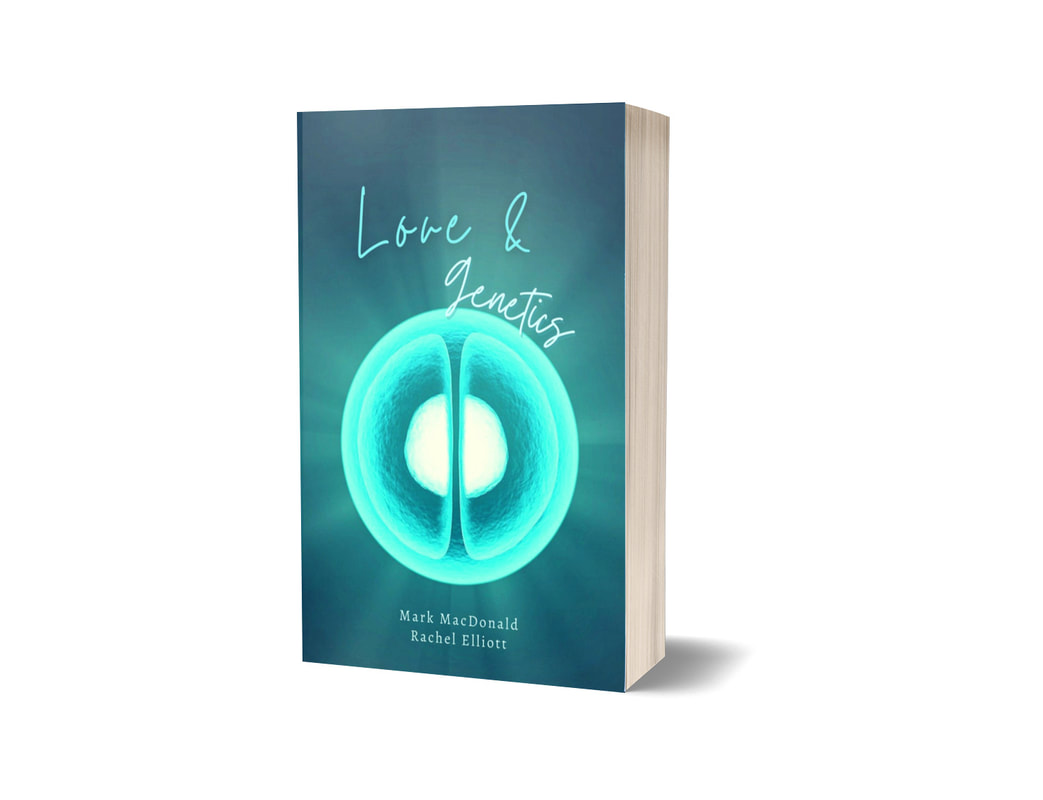 PORTLAND, OR; March 22, 2022— When a family secret comes to light, lives are changed forever in this honest, beautiful, and sometimes painful memoir. When Mark, adopted at birth, set out to FIND his genetic family as an adult, he found something he never expected—three full-blood siblings, including a persistent sister who would alter the course of his life. He finds himself faced with the emotional task of coming to know his entire birth family, along with the unintended impact it has on his parents and his marriage. This raises age-old questions around the understanding of his own identity and his place in the world—now framed in extraordinarily real and explicit terms: What defines family? Nature or nurture? Life rarely affords such an opportunity for self-examination. The story focuses on the relationship that develops between Mark and his sister, Rachel, as they discover each other through constant letters and eventual face-to-face meetings. When Rachel learns that Mark and his wife are struggling with having children, a radical idea takes over—could she, a sister he never knew and still barely knows, one who lives on the other side of the country, possibly carry their child? Would they trust her to? Including original correspondence between Rachel, Mark, and their biological mother, Marilyn, Love & Genetics follows the events of a tumultuous year in an astonishing story of love, loss, and the meaning of family. ABOUT MARK MACDONALD AND RACHEL ELLIOTT Rachel Elliott is a native Canadian who migrated south (like the geese) to escape the cold. She lives in North Carolina with her husband, Brent, and dog, Swagger, and is a proud mom to two grown daughters. She would rather be at the beach than anywhere else and loves to find an adventure. An avid reader, and recreational writer, this is her first published work. Mark MacDonald lives in Beaverton, Oregon with his wife of twenty-one years, Tina, their two children, Zoe and Alaska, and seemingly countless pets. His day jobs are engineering technology development and education. He is an unabashed science nerd and an avid supporter of women in STEM fields. An author of numerous academic publications and patents, this is his first popular non-fiction work. ABOUT UNSOLICITED PRESS Unsolicited Press is a small publisher in Portland, Oregon with a strong focus on poetry, fiction, and creative nonfiction that seeks to push the limits of literature. Some authors the team has worked with include John W. Bateman, Amy Shimshon-Santo, Taylor Garcia, and Kadzi Mutizwa. Learn more at unsolicitedpress.com. Find the press on twitter and instagram: @unsolicitedp. Love and Genetics is available on March 22, 2022 as a paperback (206 p.; 978-1-950730-90-2) and e-book (all major retailers). The title is distributed to the trade by Ingram Book Group. Publicity is being handled by Mindbuck Media. The authors are open to speaking opportunities, interviews with the media, and readings. Electronic review copies are available upon request. ### 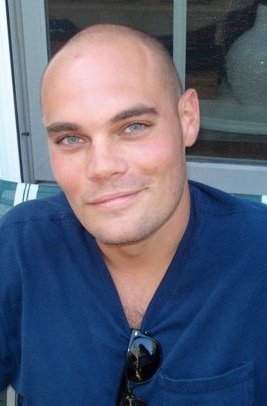 MATT LAFRENIERE is a husband, father, teacher, poet - not always in that order. He lives in Baltimore and teaches English at the Boys' Latin School of Maryland. His work has appeared in Dunes Review, Rat's Ass Review, Pilgrimage Magazine, Main Street Rag, Schuylkill Valley Journal, Spry and elsewhere. Matthew is the craftsman of DON'T TURN THE PROJECTOR OFF!. 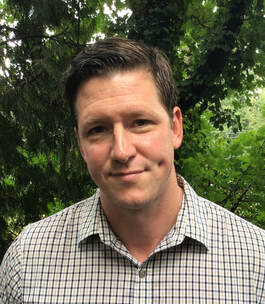 Phillip Hurst is the author of a novel, Regent's of Paris, as well as a book of nonfiction, Whiskey Boys: And Other Meditations from the Abyss at the End of Youth, winner of the 2021 Monadnock Essay Collection Prize. His writing has appeared in literary journals such as The Missouri Review, The Gettysburg Review, River Teeth, Cimarron Review, and Post Road Magazine. He currently lives and writes in the Pacific Northwest. Phillip is the author of The Land of Ale and Gloom: Discovering the Pacific Northwest. 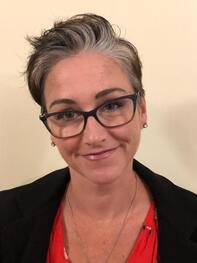 Rachel Elliott is a native Canadian who migrated south (like the geese) to escape the cold. She lives in North Carolina with her husband, Brent, and dog, Swagger, and is a proud mom to two grown daughters. She would rather be at the beach than anywhere else and loves to find an adventure. An avid reader, and recreational writer, LOVE AND GENETICS is her first published work. 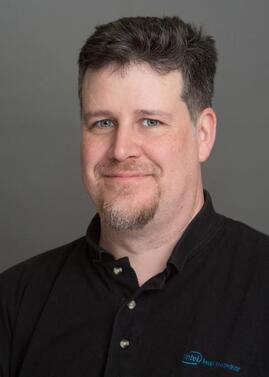 Mark MacDonald lives in Beaverton, Oregon with his wife of twenty-one years, Tina, their two children, Zoe and Alaska, and seemingly countless pets. His day jobs are engineering technology development and education. He is an unabashed science nerd and an avid supporter of women in STEM fields. An author of numerous academic publications and patents, LOVE & GENETICS is his first popular non-fiction work. 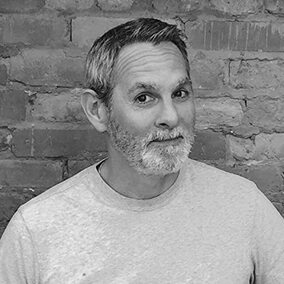 Joseph Allen Costa is a freelance writer and adjunct English professor in Tampa. He received his MFA in creative writing from the University of Tampa and his BA from the University of South Florida. His short fiction has appeared in BULL men’s fiction, Rabble Lit, the HCE Review, The Write Launch and in December Magazine as a finalist for the Curt Johnson Prose Awards. Costa is the author of three novels (The Good, The Bad and The Goalie, Discovering Dynamite! and Eye of the Storm), and one linked collection of short fiction (Comets, published by Unsolicited Press). If you could cook dinner for any author, dead or alive, who would it be? What would you make?
For sure, the late Eve Babitz (preferably pre-sobriety Eve Babitz/Eve Babitz during her sowing-wild-oats prime). I guess I’d blend up some cauliflower soup as a first course before stir frying noodles and veggies in sesame oil and oyster sauce because I’m a lazy cook and these are two of my quickest and easiest hot and homemade crowd-pleasers, healthy enough for a lifelong Southern Californian, yet starchy enough for a lifelong-maverick Southern Californian. What scares you the most about the writing process? How do you combat your fears? Revisiting incredibly unpleasant memories. I combat this fear by taking my sweet time when it comes to putting a longform piece of personal writing together. Procrastinating and distracting myself with as much as possible for weeks or months on end. Which helps to explain why it took me 11 or so years to write a book that’s not even 200 pages. Who is your biggest literary crush, author or character? Anne Shirley, although I confess that I saw/fell for the 1980s PBS adaptation of Anne of Green Gables before reading any of the books in the series (and that I didn’t take to the books as much). What books are on your nightstand? Nadia Owusu’s Aftershocks, Eric Nguyen’s Things We Lost to the Water, and Gabrielle Union’s We’re Going to Need More Wine. Favorite punctuation mark? Why? The slash (it even sounds so take-no-prisoners). You’ll notice I’ve already used it more than once within these responses. As an indecisive Libra, I’m often torn between which of two words to go with and ultimately can’t/won’t commit to just one. What book were you supposed to read in high school, but never did? I vaguely remember skimming a lot of the tail end (and maybe parts of the middle section too?) of Tolstoy’s Anna Karenina - which I (for some reason) chose to read for some kind of an independent study-esque assignment. It didn’t grab me and was too long. What inanimate object would you thank in your acknowledgements? I have two: (1) pens/pencils; and (2) paper. For much of my adulthood, I’ve gone out of my way to keep both within reach at almost all times. So much of my personal writing pops into my head, and then gets written down before I forget, when I’m far away from my computer or at home but the computer isn’t on. I also use the Notes app on my phone to jot things down, but I can handwrite sentences/paragraphs much quicker than I can peck out the letters (while fighting off autocorrection attempts) on my keypad. If you could write an inspirational quote on the mirrors of aspiring writers, what would you write? “You’re living a writer’s life.” A local acquaintance once said this to me as we ate our Wendy’s takeout in the Staten Island Ferry Terminal on my lunch hour from a low-paying temp job, during one of my “woe is me/why is my life like this at my age” eras. I’ll always remember him saying “You’re living a writer’s life” in a very matter-of-fact/why don’t you get this? tone that instantly made me feel better and still does. Does writing energize or exhaust you? Both (75 percent energize, 25 percent exhaust), the same way everything and everyone I deeply care about does. What is your writing Kryptonite? Overuse of alliteration. Not everyone is as charmed with it as I am. Same problem with the slash. Have you ever gotten reader’s block? Yes, during periods of extreme exhaustion. Do you think someone could be a writer if they don’t feel emotions strongly? Sure, but this someone isn’t as likely to move the masses the way writers deeply in touch with their emotions (and aren’t afraid to show it) will. There’s a noticeable difference between the creatively sensitive wordsmiths and those who aren’t much more than competent grammarians who play by all the technical rules. What authors did you dislike at first but grew into? So far, nobody. I have very strong first impressions. When I don’t click with someone’s vibe or voice from the jump, it rarely has gotten much better for me from there. What was an early experience where you learned that language had power? Although I don’t remember the actual incident itself, my late mom was always tickled to tell me about a time when she and I (in my toddler days) walked past a huge puddle, after a rainstorm. I apparently pointed at the puddle and yelled “RIVER!” to the delight of at least one onlooker. Just later hearing that story and absorbing how much joy the comparison brought to my mom and this random person passing by (before I ever truly thought of myself as a writer) taught me about how effective the deployment of metaphors and analogies can be, in both creative writing and daily conversation. What’s your favorite under-appreciated novel? Terry Reed’s The Full Cleveland As a writer, what would you choose as your mascot/avatar/spirit animal? As I say at one point in my book, all animals are my spirit animals! What does literary success look like to you? This, right here - getting invited to answer these kinds of questions and finally reaching the ranks of book author! What did you edit out of this book? As a longtime proponent of Less Is More, I generally tried cutting content that didn’t seem to add anything new or particularly useful to the storytelling. I cut and reworded many sentences to better protect people’s (including my own, at times) privacy. I also replaced many instances of gratuitous snarkiness, judgment, and/or anger with more compassion because, on and off the page, empathy is the attribute I would most like to be remembered for. If you didn’t write, what would you do for work? I would be an editor – which is what I already do. It’s been my day-job career for almost 20 years. 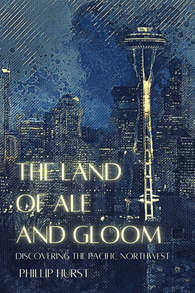 PORTLAND, OR; March 17, 2022--The Land of Ale and Gloom: Discovering the Pacific Northwest spans the summer of 2016, a summer which saw Donald Trump rise to national political prominence, and—perhaps not without coincidence—saw the author awake to the rather gloomy realization that there remained just one thing in this life which still brought him true happiness: craft beer. So he decides to make the best of it and explore the home of craft beer—the Pacific Northwest. As with any long and uncertain journey, a guide was required. Hence, the works of influential Northwest-inspired writers like Ken Kesey, Jack Kerouac, and Lucia Perillo, but most importantly, Robert Burton’s The Anatomy of Melancholy (1621), an encyclopedia of the human condition which just so happens to suggest that a cold beer might not be the worst medicine. Highlights include a kitschy Bavarian town curiously bereft of German beer, and a Viking fishing village awash with H. P. Lovecraft-inspired ales and Pokémon-obsessed teens. Also, a seaside dive serving Bud Light to the likes of Ted Bundy and the D.C. Sniper, a journey into the depressed coastal regions that gave birth to Kurt Cobain and Nirvana, Portland’s famed “Beermuda Triangle,” and the Salem mental hospital from One Flew Over the Cuckoo’s Nest. Finally, the Columbia River Gorge, where the beer and the waterfalls flow alongside a forgotten collection of Rodins and American Stonehenge, and lastly, the sun-drenched mountain town of Bend—a mecca known as “Beer Town, USA.” About the Author Phillip Hurst is the author of a novel, Regent's of Paris, as well as a book of nonfiction, Whiskey Boys: And Other Meditations from the Abyss at the End of Youth, winner of the 2021 Monadnock Essay Collection Prize. His writing has appeared in literary journals such as The Missouri Review, The Gettysburg Review, River Teeth, Cimarron Review, and Post Road Magazine. He currently lives and writes in the Pacific Northwest. About Unsolicited Press Unsolicited Press was founded in 2012 and is based in Portland, OR. The press strives to produce exceptional works of fiction, nonfiction, and poetry from award-winning authors. Learn more at www.unsolicitedpress.com. The publisher can be followed on Instagram and Twitter: @unsolicitedp The Land of Ale and Gloom: Discovering the Pacific Northwest by Phillip Hurst is available on March 17, 2022 as a paperback (354 p.;978-1-956692-03-7). The book will be distributed to the trade by Ingram. An e-book version is also available and an audiobook is in the works. The author is open to speaking with the media, holding readings, and engaging in other opportunities. What books are on your nightstand? Perfect Fools by John Saward, Black Bottom Saints by Alice Randall, Up North in Michigan by Jerry Dennis, and A Fine Canopy by Alison Swan. Does writing energize or exhaust you? Energizes! What are common traps for aspiring writers? Clinging to unnecessary words and lines. As Stephen King says, “Kill your darlings.” What is your writing Kryptonite? Laundry, cooking, cleaning, and driving my kid to and from basketball practice. I can’t wait until he gets his driver’s license. And then maybe I can figure out how to swing a maid. Have you ever gotten reader’s block? During the first months of the pandemic I couldn’t concentrate enough to read. Do you think someone could be a writer if they don’t feel emotions strongly? Sure, but I doubt their work would be interesting and worth reading. Readers want to feel something when they read a book. A lack of emotional energy will be conveyed in the narrative, the characters, and the writing will be flat. What other authors are you friends with, and how do they help you become a better writer? I belong to a group of women poets and writers whose work I greatly admire. Taking in their comments, questions, and insights over the years has not only kept me humble, it’s sharpened my skills and helped me think even more critically about my writing. There is something powerful in being part of a community of writers where you are not only receiving, but giving feedback, and helping to shape, in some small way, other’s work as well. Do you want each book to stand on its own, or are you trying to build a body of work with connections between each book? I want each book—just like I want each poem or essay in one of my books—to stand on its own. However, that doesn’t keep readers from seeing connections between them. How did publishing your first book change your process of writing? I don’t think it so much changed my writing process as much as it has made me recognize the collaborative aspect of the writing business. Working with publishers and editors is most definitely a partnership and with each of my published books, I’ve appreciated that back-and-forth experience. What was the best money you ever spent as a writer? A few years back, I spent (my husband says, “wasted”) twenty-five dollars on a mannequin I named Gladys. She moved from a neighbor’s garage to our living room. As I started decoupaging her, she became quite the muse. Gladys, along with some of the poems she inspired, recently took a trip to the Lowell Art Gallery to be part of their WordView exhibit. What authors did you dislike at first but grew into? This will probably sound cold, but I don’t like it when people or books waste my time. If I don’t engage with a book early on, I set it down and move on. While there might have been one or two authors in the bunch who could have grown on me, none have because I’ve abandoned them before our potential relationship could even bloom. What was an early experience where you learned that language had power? When I was about seven, I painted some rocks and then walked down Creston Street to Mrs. McHugh’s house. She was always giving us kids in the Westnedge Hill neighborhood candy and I wanted to give her something. “Rocks for sale,” I told her when she appeared. I mistakenly thought that “for sale” meant “free.” She gave me a quarter and after that I knocked on a lot of doors. I made a slew of money that day, maybe three or four dollars, and realized that words matter. When I returned home, I also learned that it is bad business to take money for rocks. My mother was quite upset and sent me back outside to return all the money. At that moment, Missy Martin came flying around the corner on her bike. As I couldn’t remember who gave me what, I just gave it all to Missy Martin. She took it, no questions asked. What’s your favorite under-appreciated novel? The Anthologist by Nicholson Baker. As a writer, what would you choose as your mascot/avatar/spirit animal? You not only have to have a thick shell, but you have to be steadfast and persevere to be a writer. So I would choose a turtle. I have always loved them. In fact, one of the first things I remember writing about involved turtles. What do you owe the real people upon whom you base your characters? “This family is a gold mine of stories,” my mother has told me throughout the years. I’m glad I finally listened to her and wrote Kissing the World Goodbye. So to my family members whom I unapologetically mined for this book, I owe them a copy of Kissing the World Goodbye. Al Haley is the nonfiction editor of Concho River Review. When he accepted the essay which also is the title of the book, he said of my sister, “She may be one of the best things that could happen to a writer and you get to be sisters to boot!” He’s right, and my sister probably deserves two copies. How many unpublished and half-finished books do you have? I have one unpublished 25,000-word manuscript that is geared to middle school readers who enjoy edgy fiction. While I have no half-finished books, I’m working on a poetry book about saints that is almost finished. I’ve also been chiseling away at another book but haven’t reached the half-way point with that one. What does literary success look like to you? Being able to write. Period. Krishna said something like, “You have a right to your labor, but not to the fruits of your labor.” Okay, now that’s weird. Krishna ended up surprising me and slipping into my book (the “Butter Love” essay) and now he’s making an appearance in this interview! What is going on? What’s the best way to market your books? I’ll let you know once this book becomes a best-seller. What did you edit out of this book? Some swear words. My sister has quite a mouth on her. If you didn’t write, what would you do for work? I’d be a hairstylist, funeral director, or a brick pointer. Books by Jennifer Clark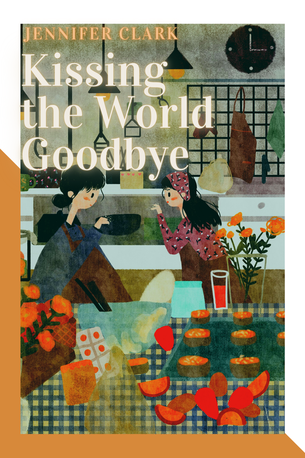 PORTLAND, OR; March 15, 2022— In Jennifer Clark’s newest collection Kissing the World Goodbye, Clark leads us into the world of memoir, braiding family tales with recipes. “Jennifer Clark’s memoir takes us right to the heart of the American family dramedy: the table, where the Zucchini Helper waits alongside Chicken Cordon Bleu—en casserole, of course, because this is Michigan. Clark braids family tales with recipes that you will want to try, if you grew up in the vast imaginary land sometimes called the Midwest. With an ironic edge and mordant wit that never compromises a deep and open heart, Clark invites us into a family that is nothing like yours and also a lot like yours, especially if you’ve ever felt like its only sane member, or the alien in the tribe, or the clan’s designated chronicler. Clark offers up her beloveds in all their exasperating, brilliant, incomparable uniqueness. When you close KISSING THE WORLD GOODBYE, you will already be missing her scientist father, in his gentle, wise intimacy with tiny invertebrate creatures; her mother, who always has something up her sleeve and who vanquishes incompetent bankers; her brother, epidemiologist and inspirational chef; and above all her sister, the exasperating and relentlessly loving Holly, queen of Costco and maker of killer strawberry-jalapeño margaritas. Jennifer Clark, who has worked mostly in poetry, here mines the secret of memoir: that in the ragged particulars of our lives lies the vast human story, full of yearning, grief, loyalty, intimacy, laughter, and appetite.” --Gail Griffin, author of Grief’s Country: A Memoir in Pieces, a 2021 Michigan Notable Book About Jennifer Clark Jennifer Clark is the author of three full-length poetry collections: A Beginner’s Guide to Heaven (Unsolicited Press), Necessary Clearings, and Johnny Appleseed: The Slice & Times of John Chapman (both published by Shabda Press). She is also the author of the children’s book What Do You See In Room 21 C? and the co-editor of the anthology, Immigration & Justice For Our Neighbors (both Celery City Books). Her newest collection Kissing the World Goodbye (slated for a March 2022 release by Unsolicited Press) ventures into the world of memoir, braiding family tales with recipes. About Unsolicited Press Unsolicited Press was founded in 2012 and is based in Portland, OR. The press strives to produce exceptional works of fiction, nonfiction, and poetry from award-winning authors. Learn more at www.unsolicitedpress.com. KISSING THE WORLD GOODBYE is available on March 15, 2022 as a paperback (198 p.; 978-1-956692-07-5) and e-book (all major retailers). The title is distributed to the trade by Ingram. ### Press only, Unsolicited Press Eric Rancino 619.354.8005 marketing@unsolicitedpress.com For artist interviews, readings, and podcasts: Jennifer Clark 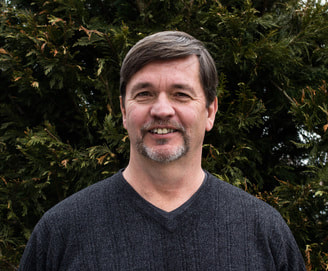 Mick Bennett is what most writers start out as: human. A person with a rich background and an ever-shaping imagination that eventually unleashes itself onto paper. Bennett grew up in Belmar, NJ, two blocks from the beach. From moments as a lifeguard in New Jersey to bar tending in Pennsylvania to teaching English at all levels, Bennett is currently living his life building characters, plotting climaxes and kickin' ass wherever he goes. Mick Bennett holds an M.A. from Shippensburg University. But who cares because that didn't make him a writer. His dedication to the craft and ability to describe rich worlds make him a writer. Prior to publication with Unsolicited Press, Bennett self-published The Bread of Teaching in 2009. The book demonstrates Bennett's forward push toward publication with a press. Bennett has been married to his wife for nearly 31 years, and they have two children, Nathan, 26, and Erin, 20. His life is simple and simplicity is divine. 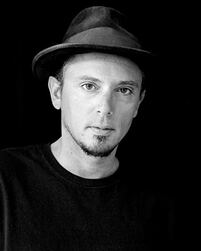 Originally from Brooklyn, NY, writer, poet, performer, and playwright, John Biscello, has lived in the high-desert grunge-wonderland of Taos, New Mexico since 2001. He is the author of four novels, Broken Land, a Brooklyn Tale, Raking the Dust, Nocturne Variations, and No Man’s Brooklyn; a collection of stories, Freeze Tag, two poetry collections, Arclight and Moonglow on Mercy Street; and a fable, The Jackdaw and the Doll, illustrated by Izumi Yokoyama. He also adapted classic fables, which were paired with the vintage illustrations of artist, Paul Bransom, for the collection: Once Upon a Time, Classic Fables Reimagined. His produced, full-length plays include: LOBSTERS ON ICE, ADAGIO FOR STRAYS, THE BEST MEDICINE, ZEITGEIST, U.S.A., and WEREWOLVES DON’T WALTZ. Some of his primary influences and creative heroes include: Henry Miller, Charlie Chaplin, Ernest Hemingway, John Fante, Anais Nin, Jack Kerouac, Knut Hamsun, Yasunari Kawabata, William Saroyan, Dr. Seuss, Dylan Thomas, Julio Cortazar, Patrick Modiano, Marguerite Duras, Dylan Thomas, Haruki Murakami, Paul Auster, Raymond Carver, Sylvia Plath, David Lynch, Billie Holiday, Miles Davis, and the list goes on and on and on. Books by the AuthorsSMOL Fair is an alternative, virtual book fair that will be 'live' from March 19-26, 2022. This year Brian Evenson will be the keynote speaker. Not to mention, plenty of presses are getting involved and events will be happening through the week. Moreover, there will be giveaways! We have a page dedicated to SMOL Fair that will keep you up-to-date on our events and our giveaways.
You can keep informed here: https://www.unsolicitedpress.com/smolfair2022.html Join us tonight at 5:30PM Pacific for a reading with authors Kadzi Mutizwa and Jennifer Clark. Our reading series is a yearlong expedition featuring authors with books just out or books that we published years ago. You can join the event by heading to our events calendar. No RSVP needed. About the Kadzi Mutizwa Originally from Cleveland, Ohio, Kadzi Mutizwa now lives in New York City. Living of Natural Causes is her first book. About Living of Natural Causes In these 12 humor-laced personal essays, Kadzi Mutizwa (a midwestern New Yorker) reflects on her trajectory as a high(ish)-functioning outlier. Themes taken up include mounting self-awareness, facing your foibles and failures, not giving up while becoming more measured about giving in, sucking at yoga, and gradually rising into your full authenticity. Living of Natural Causes is about recognizing how complex each of us are and should be. About Jennifer Clark JENNIFER CLARK is the author of three full-length poetry collections, most recently, A Beginner’s Guide to Heaven (Unsolicited Press). She is also the co-editor of the anthology, Immigration & Justice For Our Neighbors (Celery City Books) and editor of Michigan Roots, a Poetry Society of Michigan anthology. She’s authored a children’s book on college awareness, What Do You See In Room 21 C? (Celery City Books), and her poems, essays, and fiction have appeared in numerous literary journals, magazines, and anthologies. She lives in Kalamazoo, Michigan. Her website is jenniferclarkkzoo.com. About Kissing the World Goodbye Clark’s latest book, Kissing the World Goodbye, is a memoir infused with recipes that invites the reader to crouch down and notice the small things in life we too easily overlook. Everything in this world, no matter how small, is worthy of consideration for Clark, from isopods barreling through Tasmanian soil to the origins of childhood nicknames. Big things matter, too, like siblionic love, a term she coins in an attempt to describe the indescribable connections between siblings. Within this funny, poignant, and often tasty memoir, Clark weaves in serious issues such as the perpetual closeness of various forms of loss, and family members, particularly her sister’s, easily moving on in the face of matters that weigh Clark down. And much weighs her down: naming fish, Ernest Borgnine’s eyebrows, cell phones, instapots, and more. Bottom line: this lyrical journey reminds us life is messy, funny, fragile, and fleeting. For even as we kiss the world hello, we kiss it goodbye. 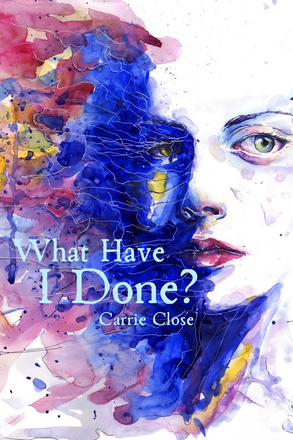 PORTLAND, OR; March 8, 2022— In What Have I Done?, Carrie Close writes, “all these little birds keep picking at me/hard, determined beaks peck through skin, scrape/against bone—they dance and chirp ominous tones…” The connection Close builds between themes of love, motherhood, and relationships hits you in the face like a taut rubber band forcing you to hone in on every last detail. Close pens a charged, feminist collection that avoids polishing for the sake of looking good. From the Book Paper cut-out “I just want paper cut-outs to love me,” he says, as I moan into the phone and he jerks off in a Subway restroom, and I tell him about the sex I had the day before with the engineer who held my hands above my head when I told him to stop and Wedding Crashers played intermittently between commercials. About Carrie Close Carrie Close was born and raised in Maine, where she lives with her boyfriend Josh, and their two sons, Emerand and Zephyr, and their daughter Zayra. You can read more of her work at carrieclose.com. About Unsolicited Press Unsolicited Press was founded in 2012 and is based in Portland, OR. The press strives to produce exceptional works of fiction, nonfiction, and poetry from award-winning authors. Learn more at www.unsolicitedpress.com. WHAT HAVE I DONE? is available on March 8, 2022 as a paperback (120 p.; 978-1-950730-91-9) and e-book (all major retailers). The title is distributed to the trade by Ingram. 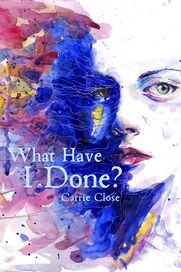 Carrie Close was born and raised in Maine, where she lives with her boyfriend Josh, their two sons, Emerand and Zephyr, and their daughter, Zarya. You can read more of her work at carrieclose.com. Her first collection of poetry and short stories, What Have I Done? is forthcoming from Unsolicited Press in March 2022. In What Have I Done? Carrie Close writes, “all these little birds keep picking at me/hard, determined beaks peck through skin, scrape/against bone—they dance and chirp ominous tones…” The connection Close builds between themes of love, motherhood, and relationships hits you in the face like a taut rubber band forcing you to zero in on every last detail. Close pens a charged, feminist collection that avoids polishing for the sake of looking good. 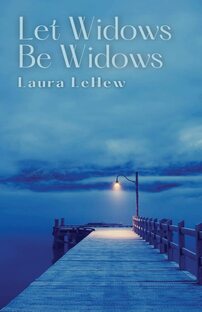 Former girl scout Laura LeHew is obsessed with the creepy, creaky underbelly of life and whatever lies beyond. Widely published her collections include: Dear John--(The Poetry Box) is a collection of poems that explore the multi-facets of love by using diverse points of view to reveal romantic love, loving friendships, and love that is complicated, Buyer’s Remorse (Tiger’s Eye Press—Infinities) poems on abuse, Becoming (Another New Calligraphy) a non-linear discourse on alcoholism and dementia, Willingly Would I Burn, (MoonPath Press) themed around math and science, It’s Always Night, It Always Rains, (Winterhawk Press) murder/noir and Beauty (Tiger’s Eye Press) fairy tales. Let Widows be Widows is an elegiac collection of poetry. Using diverse points of view, Widows illuminates our various states of loss, hope, love and mourning we experience with death. This book is not a lament but rather an exploration on how we overcome grief. 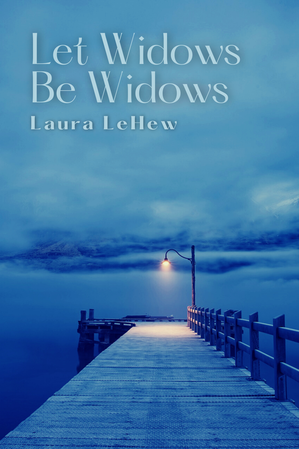 PORTLAND, OR; March 1, 2022 -- Let Widows be Widows is a collection of poetry in five sections. This collection is about the dead and the living. It illuminates various states of loss, hope, love and mourning from diverse points of view. It begins with denial. A door closing. Happenstance. We are unaware or under-aware of terminal illness or the shock of an unexpected sudden death. Words that we have left unsaid. Widows examines how we bargain with ourselves. What we tell the dying, what we tell the living. It looks at how we modify our behaviors, experiences, to try to overcome the unsolvable dilemma of death. We are witnesses, passing along the stories of our ancestors, friends, pets. It’s about those who have gone to war or faced the great unknowing, how we are each a memorial and a monument to the other. This book is about duality. When we are faced with peril, we roll a d20 die to see if it is going to affect us, and then we roll another die to determine how much damage is dealt. Every day we walk with the different sides of death, all the pieces converging windblown into our life. Finally, it is about the actions we take, our letting go, in order to overcome our grief. About Laura LeHew Former girl scout Laura LeHew is obsessed with the creepy, creaky underbelly of life and whatever lies beyond. Widely published her collections include: Dear John--(The Poetry Box) is a collection of poems that explore the multi-facets of love by using diverse points of view to reveal romantic love, loving friendships, and love that is complicated, Buyer’s Remorse (Tiger’s Eye Press—Infinities) poems on abuse, Becoming (Another New Calligraphy) a non-linear discourse on alcoholism and dementia, Willingly Would I Burn, (MoonPath Press) themed around math and science, It’s Always Night, It Always Rains, (Winterhawk Press) murder/noir and Beauty (Tiger’s Eye Press) fairy tales. About Unsolicited Press Unsolicited Press was founded in 2012 and is based in Portland, OR. The press strives to produce exceptional works of fiction, nonfiction, and poetry from award-winning authors. Learn more at www.unsolicitedpress.com. The publisher can be followed on Instagram and Twitter: @unsolicitedp Let Widows be Widows is available on March 1, 2022 as a paperback (160 p.; 978-1-956692-06-8) and e-book (all major retailers). The title is distributed to the trade by Ingram. The author is open to speaking with the media, holding readings, and engaging in other author opportunities. |
Popular Topics
All
We Support Indie Bookshops |
619.354.8005
info@unsolicitedpress.com
Portland, Oregon
